
The title sounds almost funny, doesn’t it? However, listening to the funeral-like tune and “strange,” old-fashioned words and expressions certainly won’t make you laugh.
Every time I see proud American or French people jump up and sing along when their anthem starts playing, my heart clenches. Play the Czech anthem in a room full of Czechs… Nothing will happen. Sadly, we’re not patriots––quite the opposite, actually––and it shows. Don’t get me wrong, when the Czech hockey team won the gold medal at the Olympics 20 years ago, most of us felt very… Czech. Since then… Radio silence in the patriotism department.
In this article, we will explore and decipher the lyrics and history of the Czech national anthem. According to some, it is a beautiful expression of Czech ideals: humanism and deep love for our beautiful land. Compared to the heroic French La Marseillaise or spunky Slovakian Nad Tatrou sa blýská (which used to be the second part of Czechoslovakian anthem before 1993––more on that later), it’s not much. It seems to lack energy and fire… And I can’t help but compare their presidents to our old man when I hear the slow, sort of tired-sounding tune.
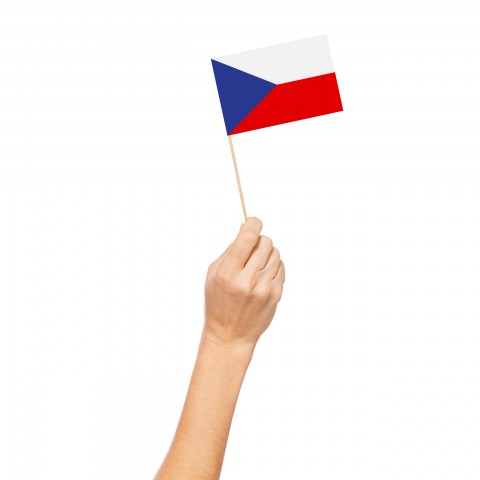
Czech flag – Česká vlajka.
 Table of Contents
Table of Contents
- The History of Czech Anthem: It Started with an Opera
- Lyrics of Kde domov můj
- When is it played?
- How CzechClass101.com Helps You Learn Czech in a Fun Way
1. The History of Czech Anthem: It Started with an Opera
Believe it or not, this piece was originally written for a patriotic opera comedy called Fidlovačka aneb Žádný hněv a žádná rvačka (“Fidlovačka, or No Anger and No Brawl”). In the play, written by Josef Kajetán Tyl and composed by František Škroup, it is performed during a very emotional, sad scene by a blind violinist. The author, Josef Kajetán Tyl, wasn’t sure about the song’s quality, and almost convinced the director to leave it out. He felt the composer’s version, as opposed to the festive chorale that he asked him to compose, was too sentimental.
Imagine his surprise when Fidlovačka became widely popular among the Czech audience who, at those dark times, striving for recognition and trying and failing to break free from the oppressive Habsburg monarchy––in 1834, people would grab every chance to be Czech, speak Czech, sing in Czech to affirm their national identity, and let the German empire know they would hold their ground no matter what.
It is hard to believe that some people found this sweet song “vulgar.”
- ➣ Czechs were only an ethnic minority, and the goal of the opera and the future anthem was to enhance the national feeling and pride.
Kde domov můj was soon accepted as an informal Czech anthem, and when Czechoslovakia, aka the First Republic, was founded in 1918, it became the first official anthem of the young country. Because of the ethnic and language diversity (it was VERY common to speak German at that time), the anthem was translated into German and Hungarian. The German version of the anthem was used between 1918 and 1938.
Fun Facts:
- The title of the play later became the name of a theater in Prague.
- The bilingual Czechoslovakian version was played in many Slovakian towns at noon before the countries split in 1993.
- Before Czechoslovakia was established, there was a long debate about whether the song was still suitable and whether there should be a more “serious” piece written for this noble purpose. Remember, opera was almost like today’s movies, and having a “movie soundtrack” as an anthem was considered almost frivolous by officials and folk.
- Here is a great example of typical Czech dark humor: “Do you know what would happen if the Jaslovské Bohunice powerplant (Slovakian nuclear powerplant) exploded? We would switch anthems: Slovaks would sing “Where My Home Is” and Czechs “Lightning over the Tatras.”
2. Lyrics of Kde domov můj
- ➣ Although the Czech anthem has two stanzas, only the first one is played at ceremonies, important official events, and sports championships.
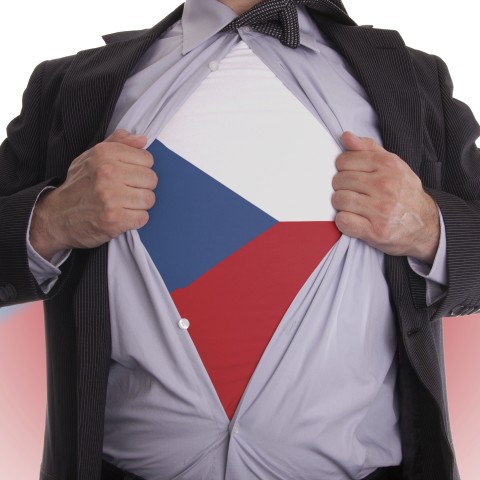
Patriot – Vlastenec.
A – Czech Anthem Lyrics and English Translation:
First verse:
Kde domov můj, kde domov můj,
“Where my home is, where my home is,”
voda hučí po lučinách,
“Streams are rushing through the meadows,”
bory šumí po skalinách,
“Midst the rocks sigh fragrant pine groves,”
v sadě skví se jara květ,
“Orchards decked in spring’s array,”
zemský ráj to na pohled!
“Scenes of paradise portray.”
A to je ta krásná země,
“And this land of wondrous beauty,”
země česká domov můj,
“Is the Czech land of my home,”
země česká domov můj!
“Is the Czech land of my home!”
Second verse:
Kde domov můj, kde domov můj,
“Where my home is, where my home is,”
v kraji znáš-li bohumilém
“If, in the heavenly land, you have met”
duše útlé v těle čilém,
“Slender souls in spry bodies,”
mysl jasnou, vznik a zdar
“Of clear mind, vigorous and prospering,”
a tu sílu vzdoru zmar,
“And with a strength that frustrates all defiance,”
to je Čechů slavné plémě
“That is the glorious nation of Czechs”
mezi Čechy domov můj!
“Among the Czechs (is) my home!”
mezi Čechy domov můj!
“Among the Czechs, my home!”
B – Czechoslovakian Anthem: 1918 – 1993
Before the countries split on the 1st of January, 1993, the first stanza and the Slovakian song Nad Tatrou sa blýská (“Lightning over the Tatras”, literally “Above Tatras it is lightning”)––written in 1844––formed the official, two-part, bilingual Czechoslovak anthem.
- ➣ Both were played and sung in their respective languages, the first, Czech part in Czech, the second, Slovakian stanza, in Slovakian.
The main theme is a storm over the Tatra mountains––a symbol of danger threatening to the Slovakian people, and their strong desire to overcome all their hardships. This patriotic song was particularly popular during the national insurgencies in 1848 – 1849.
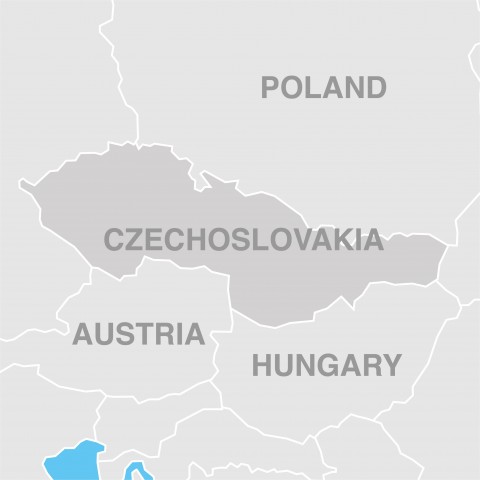
Czechoslovakia – Československo.
The Slovakian Part of Czechoslovakian Anthem:
Nad Tatrou sa blýska, hromy divo bijú
“There is lightning over the Tatras, thunders wildly beat,”
Nad Tatrou sa blýska, hromy divo bijú
“There is lightning over the Tatras, thunders wildly beat.”
Zastavme ich, bratia, veď sa ony stratia,
“Let’s stop them, brethren, after all they’ll disappear,”
Slováci ožijú.
“the Slovaks will revive.”
Zastavme ich, bratia, veď sa ony stratia,
“Let’s stop them, brethren, after all they’ll disappear,”
Slováci ožijú.
“the Slovaks will revive.”
C – What Does the President Think?
Our former president Václav Klaus offers his opinion: “I hear it quite often––played now by a Kazakh orchestra, now by an Indian, Qatar or Israeli one. Their renderings are quite original. Recently I was in the United States, near Boston, at Brandeis University, and when I was entering the room to deliver my lecture, a jazz trio played our national anthem – an absolutely unconventional group of American jazzmen. By the way, the national anthem is a very frequent topic of my discussions with my counterparts. I often say: ‘It is interesting how slow, solemn and quiet our anthem is, compared to yours, which is youthful, striking and full of spirit.’ I approach the national anthem with great humbleness. It is a serious thing.”
The newest recording of the Czech national anthem was presented at a ceremony in the National Museum in Prague on the 28th of September 2008––the Day of Czech Statehood.
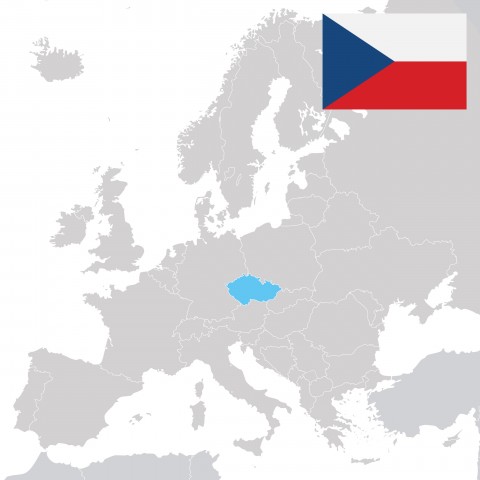
The Czech Republic has been a member of the EU since 2004.
D – Related Vocabulary
| Czech | English |
| Hymna | Anthem |
| Státní znak | State Emblem |
| Standarta prezidenta republiky | Standard of the President of the Republic |
| Státní svátek | Public holiday (or Bank holiday, you can find the list of Czech public holidays here) |
| Vlajka | Flag |
| Vlastenectví | Patriotism |
| Slavnostní ceremoniál | Festive ceremony |
| Projev prezidenta republiky | Speech by the President of the Republic |
3. When is it played?
Kde domov můj is played at important, official speeches, memorial services and ceremonies and, of course, sports events (during championships and Olympics).
- ➣ Basically, it’s played every time the Czech flag is raised, and when there’s a great victory or revolution.
Czech Anthem Videos:
Here’s a new version with beautiful scenery in the background:
This is a very emotional footage from the Velvet Revolution––end of communist era––from 1989, sung by two widely popular Czech singers. It contains the Slovakian part as well:
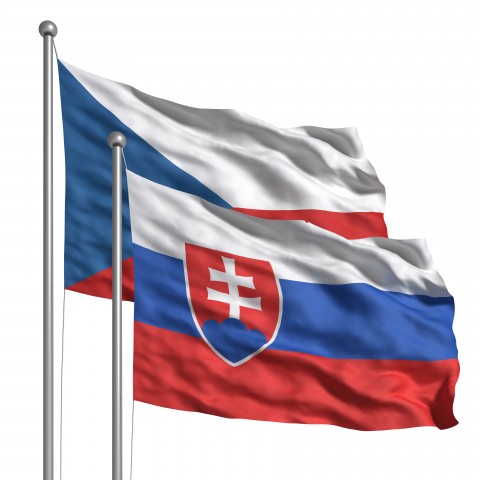
The 28th of October: Independent Czechoslovak State Day, of many Czech bank holidays.
4. How CzechClass101.com Helps You Learn Czech in a Fun Way
That’s it, guys! I hope you enjoyed this article and learned something new! In case the location words and phrases listed in this article weren’t enough for you, and you want to keep learning, please check out our Basic Bootcamp – the very basic grammar and vocab in 5 compact lessons.
If you’re taking Czech language learning seriously, and want to learn Czech fast, free and online, you might grab a Czech grammar book or learn online (which is way more convenient). Seriously, learning a new skill has never been easier. Just grab your phone and get to work!
CzechClass101.com will make learning Czech easy, exciting, and fun. With us, it’s not about endless memorizing or thick textbooks. Learn Czech the better way – with us, you’ll make progress faster than you could imagine!
What can you find here?
- English to Czech translation and pronunciation tips/tricks
- Over 630 audio and video lessons
- Vocabulary learning tools
- Spaced repetition flashcards
- Detailed PDF lesson notes
Sign up now, it’s free!
One last thing: Let us know in the comments if you like the Czech anthem, and how you feel when your country’s national anthem is playing. Share some useful tips and tricks!

Good Morning, Class: Czech Classroom Phrases

If you’re planning to study or teach in the Czech Republic, this article is just for you. You might be surprised by the subtle differences between Czech and English communication during classes––be it greetings, or how we address the teachers––I know I was.
I first started with English in 3rd grade. I was 8 years old, and learning to say all those new, funny sounds was very exciting and fun. Let me tell you, my 40-something fiancé doesn’t find it quite as exciting, and he’s constantly asking, “why do y’all say this and not that”? And I would like to address these quirky nuances in this article as well. Because no matter how funny and kind our “Mrs. Teacher” was, most of the things she taught us were just literal translations, and watching movies in English 15+ years later brought up a lot of doubt and questions that will remain unanswered. (We called the eraser “rubber.” Fun times.)
In this article, you will learn a lot of Czech words and not-so-basic Czech phrases: Czech classroom greetings and classroom vocabulary in Czech. Do you know how our school system works? No? You will find all the info here.

 Table of Contents
Table of Contents
- Good morning, Mrs. Teacher: Czech Classroom Greetings
- Czech Classroom Phrases and Questions
- What?: Czech Classroom Phrases When Asking for Clarification
- Dog Ate My Homework: Czech Classroom Phrases for Apologizing and Absence
- Classroom Vocabulary in Czech: My Favorite Subject Is…
- How CzechClass101.com Helps You Learn Czech in a Fun Way
1. Good morning, Mrs. Teacher: Czech Classroom Greetings
First things first. Younger kids (elementary and high school) do not address their teachers using their last names. Even your favorite Mrs. Dumbledore from 5th grade would be degraded to an official “Mrs. Teacher“––paní učitelka.
University professors tend to be either super formal (pan profesor and paní profesorka, pan doktor and paní doktorka––”Mr. and Mrs. Professor”, “Mr. and Mrs. Doctor”, etc.), but there might be “an exception that confirms the rule” (výjimka potvrzuje pravidlo).
- ➢ Having said that, you always address your teachers with the formal tone, vy (“You” 2nd person singular), just like in Spanish or French, for example.
- ➢ You address them pan or paní [title]––Mr. Or Mrs. [title], not their last name.
- ➢ [Male] Pan učitel/profesor (“Mr./Mrs. teacher/professor”)
- ➢ [Female] Paní učitelka/profesorka (“Mrs. teacher/professor”)
Here are a few examples:
- Paní učitelko, mám dotaz ohledně základních českých frází. – “Mrs. teacher, I have a question regarding basic Czech phrases.”
- Pane učiteli, myslíte tuto kapitolu? – “Mr. teacher, do you mean this chapter?”
- Paní profesorko, chci s vámi mluvit o mé práci. – “Mrs. professor, I would like to talk to you about my assignment.”
- Pane profesore, máte čas se mnou prodiskutovat moji bakalářskou práci? – “Mr. professor, do you have time to discuss my bachelor thesis with me?”
Most Common Czech Classroom Greetings:
- Dobré ráno /dobrý den, pane učiteli/profesore, paní učitelko/profesorko. – “Good morning, Mr. teacher/professor.”
- Uvidíme se zítra, [name]. – See you tomorrow, [student name].
- Na shledanou zítra. – “Bye until tomorrow.”
- Na shledanou. – “Bye (literally “until we meet each other again”, formal.)
- Ahoj, čau, nazdar, jak se máte? Jak to jde? Jak jste se vyspali? – “Hello, hi, hi, how are you? How is it going? How did you sleep?” (informal)
- Ahoj, máš úkol? – “Hi, do you have the homework?”
- Čau, učila ses? – “Hey, did you study?”
- Ahoj, píšeme dneska test? – “Hi, do we have a test today?” (literally, “are we writing a test today”)

For more ways to say hello in Czech, read this great article full of basic Czech phrases.
2. Czech Classroom Phrases and Questions
Here’s a list of the most common Czech classroom command phrases you might hear from your teachers. All of these example sentences are in the plural form.
- Prosím otevřete si učebnice na straně 111. – “Please open your textbook on page 111.”
- Dobře poslouchejte. – “Listen carefully.”
- Ticho, prosím. – “Silence, please.”
- Chce se někdo na něco zeptat? – “Does anyone want to ask anything?”
- Podívejte se na tabuli a přečtete tato česká slova. – “Look at the board and read these Czech words.”
- Otevřete si knihy. – “Open your books.”
- Zavřete knihy. – Close your books.
- Opakujte po mně, prosím. – “Repeat after me, please.”
- Přihlaste se/Zvedněte ruku. – “Raise your hand.”
- Budete pracovat ve dvojicích. – “You will work in pairs.”
- Vstaňte, prosím. Posaďte se, prosím. – “Stand up please. Sit down, please.”
- Teď prosím podtrhněte správná slova a přeškrtněte nesprávná. – “Underline the word and cross out the wrong ones.”
- Vypněte telefony, prosím. – “Turn off your phones, please.”
- Máte 15 minut. – “You have 15 minutes.”
- Jak se hláskuje tohle slovo? – “How do you spell this word?”
- Jak se tohle řekne česky? – “How do you say this in Czech?”
- Napadá vás nějaký příklad? – “Can you think of an example?”
- Rozumíte všemu? – “Do you understand all of this?”
- Je to všem jasné? – “Is it clear to everyone?” (as in, “does everyone understand?”)
- Chce se někdo na něco zeptat? – “Does anyone want to ask anything?”
- Potřebuje někdo pomoc s tímhle cvičením? – “Does anyone need help with this exercise?”
That’s a Cool Pencil: Talking about School Supplies in Czech
Did you know it is very common to keep all your textbooks at home and bring them to school every single day? Lockers aren’t as big as in the US here, and Czech students carry heavy bags of books around.
If needed, you will ask your classmates:
- Můžu si půjčit [supply]? – “May I borrow your/a [supply]?”
- Půjčíš mi [supply], prosím? – “Would you lend me [supply], please?”
- Ztratil/a jsem [supply]. – “I lost my [supply].”
- Nebudeš mít vždycky v kapse kalkulačku! – “You won’t always have a calculator in your pocket.”

Czech Classroom Vocabulary––Supplies:
- Tužka – “Pencil”
- Pero or Propiska – “Pen”
- Poznámkový blok or Sešit – “Notebook”
- Pořadač – “Binder”
- Složka – “Folder”
- List papíru – “Sheet of paper”
- Kniha – “Book”
- Učebnice – “Textbook” (more common than “book”)
- Penál – “Pencil case”
- Pravítko – “Ruler”
- Guma – “Eraser”
- Nůžky – “Scissors”
- Kalkulačka – “Calculator”
- Ořezávátko – “Pencil sharpener”
Czech Classroom Vocabulary––Places and Things:
- Třída or Učebna (from the word učit – “learn”) – “Class” (the word “class” is more used in high schools and elementary schools)
- Kavárna – “Cafeteria”
- Sborovna – “Teacher’s room”
- Sekretariát – “Secretariat”
- Ředitelna – “Principal’s office”
- Kancelář – “Office”
- Menza – “University canteen”
- Knihovna – “Library”
- Kopírka – “Copy machine”
- Zkouška – “Exam”
- Test – “Test”
- Ústní zkouška – “Verbal exam”
- Písemná zkouška – “Written exam”
- Poslech – “Listening”
- Psaní – “Writing”
- Porozumění – “Understanding”
- Úkol – Homework
- Práce – “Assignment”
- Prezentace – “Slideshow” or “Presentation” or “Pitch”
3. What?: Czech Classroom Phrases When Asking for Clarification
Wisdom is knowledge, and as we say, žádný učený z nebe nespadl––”no educated one has ever fallen from the skies,” as in “practice makes perfect.”
- Nerozumím/nechápu. – “I don’t understand.”
- Můžete to zopakovat, prosím? – “Can you repeat that, please?” (formal voice, when asking the teacher)
- Můžu se na něco zeptat? – “Can I ask you something?” (literally just “can I ask on something”)
- Chci se na něco zeptat. – “I want to ask about something.”
- Co řekl/řekla? – “What did he/she say?”
- Můžete mi vysvětlit tuhle část, prosím? – “Could you explain this part to me, please?”
- Chci se ujistit, že to chápu. – “I want to make sure I understand this.”
- Není mi jasná jedna věc. – “One thing isn’t clear to me.”
- Co to znamená? – “What does it mean?”
- Takže to neznamená, že… – “So it doesn’t mean that…”
For more Czech questions (with pronunciation!), check out these lists.

4. Dog Ate My Homework: Czech Classroom Phrases for Apologizing and Absence
How to tell the teacher you aren’t able to attend their class or why you didn’t attend or why you were late? Read on:
- Není mi dobře, dnes nepřijdu. – “I’m not feeling well. I won’t be able to attend school today.” (literally just “I won’t come.”)
- Omlouvám se za zpoždění, musel/a jsem… – “Sorry I’m late. I had to…” (literally, “I’m sorry for the delay”)
- Můj pes mi sežral úkol. – “My dog ate my homework.”
- Chci se omluvit z dnešní hodiny, jdu k lékaři. – “I want to excuse myself from today’s lesson, I have a doctor’s appointment.” (literally, “I’m going to a doctor.”)
- Omlouvám se, nemám tu práci hotovou. – “I am sorry, I didn’t finish the assignment.” (literally “I don’t have the assignment finished.”)
- Omlouvám se, zapomněl/a jsem. – “I am sorry, I forgot.”
- Omlouvám se, ale mám spoustu práce a nestihl/a jsem to. – “I am sorry, but I have a lot of work and I didn’t make it.”
- Neměl/a jsem čas si to přečíst. – “I didn’t have time to read it.”
5. Classroom Vocabulary in Czech: My Favorite Subject Is…
- V [subject] nejsem moc dobrý/á. – “I’m not good at [subject].”
- Můj oblíbený předmět je [subject]. – “My favorite subject is [subject].”
- Nejde mi [subject]. – Literally “[Subject] doesn’t go me”, as in “I am not good in [subject].
- Jde mi [subject]. – Again, “[Subject] goes me.”
- Nejradši mám [subject]. – “I like [subject] the most.”
- Nenávidím [subject]. – “I hate [subject].”
- Chci studovat český jazyk. – “I want to study Czech language.”
List of School Subjects in Czech:

- Matematika – “Math”
- Biologie – “Biology”
- Chemie – “Chemistry”
- Angličtina – “English”
- Čeština – “Czech”
- Tělocvik – “PE”
- Literatura – “Literature”
- Dějepis (elementary school) or Historie – “History”
- Psychologie – “Psychology”
- Sociologie – “Sociology”
- Filozofie – “Philosophy”
- Geometrie – “Geometry”
- Ekonomie – “Economy”
- Politologie – “Politology”
- Zeměpis (elementary school) or Geografie – “Geography”
- Marketing – “Marketing”
- Management – “Management”
6. How CzechClass101.com Helps You Learn Czech in a Fun Way
That’s it, guys! I hope you enjoyed this article and learned something new! If the Czech words and phrases listed in this article weren’t enough for you, and you want to keep learning, please check out our Basic Bootcamp––basic Czech for foreigners (grammar and vocab) in 5 compact lessons.
If you’re taking Czech language learning seriously and want to study Czech fast, free, and online, you might grab a Czech grammar book or learn online (which is way more convenient). Seriously, mastering a new skill has never been easier. Just grab your phone and get to work!
CzechClass101.com will make online Czech classes easy, exciting, and fun. With us, it’s not about endless memorizing or thick textbooks. Study Czech the better way – with us you’ll make progress faster than you could imagine!
What can you find in these awesome online Czech lessons?
- English to Czech translation and pronunciation tips/tricks
- Over 630 audio and video lessons
- Vocabulary learning tools
- Spaced repetition flashcards
- Detailed PDF lesson notes
- Czech for foreigners––the better way
Ready to study the Czech language? Sign up now, it’s free!
One last thing: Let us know in the comments what YOUR favorite subject was (in Czech, of course). Share some useful tips and tricks!

The Ultimate Guide to Czech Restaurant Phrases

Who doesn’t love eating out? Especially in foreign countries! If you love exploring exotic cuisines or simply have to eat out while in the Czech Republic, this list of Czech restaurant vocabulary and phrases will come in handy.
I have noticed how much people appreciate it when a foreigner tries to speak Czech. It’s a tough language (or so I’ve heard), and locals get genuinely excited when they realize my fiancé is a REAL American who says děkuju (“thank you”) and prosím (“you’re welcome” and “please”). In the Czech Republic, the staff tends to be much nicer. In Barcelona, we were getting free desserts and complementary wine. Austrian baristas smile if I order my coffee in German. Enough about cultural differences; if you want to know more about Czech traditions and culture, check out this article.
It goes without saying that being able to read the Czech food menu or ask your waiter about allergens in your dish of choice (or explain basic Czech foods) might save you a lot of headaches.
I once ordered “latté” in an Italian café. I spoke (poor) English, and the Italian owner seemed confused but obliged, as the customer’s wishes shall be fulfilled no matter what. Guess what. I got what I asked for: latté––milk. First of all, had I come prepared, I would have known the drink of my choice is actually called “latté macchiato,” plus I would have been able to understand what the Italian owner was saying (“You want just milk? Milk without coffee?”).
Let’s learn from my mistakes and dive into this article––a comprehensive cheat sheet––Czech vocabulary on how to order food in Czech and basic Czech phrases.
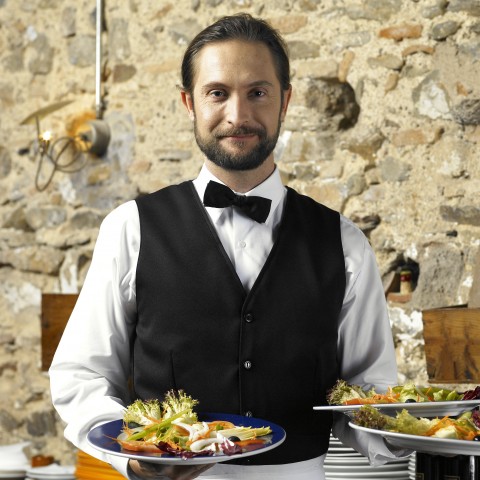
Číšník. – “Waiter.”
 Table of Contents
Table of Contents
- Restaurant Phrases in Czech: Getting There
- How to Order Food in Czech
- Czech Restaurant Phrases: After Dining
- How CzechClass101.com Helps You Learn Czech in a Fun Way
1. Restaurant Phrases in Czech: Getting There
- Chtěl/a bych rezervovat stůl pro dva na sobotu, 7. května, V pět hodin. – “I’d like to book a table for two on Saturday, May 7th, at 5pm.”
- Stůl pro čtyři, prosím. – “A table for 4, please.”
- Máte volný stůl na zahrádce? – “Do you have a table on the patio?”
- Jak dlouho budeme muset počkat? – “How long do we need to wait?”
- Nabízíte vegetariánské/veganské jídlo? – Do you offer vegetarian/vegan food?
- Máme rezervaci na jméno [name].– “We have a reservation for the name [name].”

Stůl pro dva, prosím. – “Table for two, please.”
A- Conversation Example:
| Staff | You |
| Dobrý den, restaurace Grandezza, jak vám mohu pomoci? “Hello, “Grandezza” restaurant, how may I help you?” | Dobrý den, chci rezervovat stůl na zítra večer. “Hello, I would like to book a table for tomorrow evening.” |
| Jistě. Pro kolik lidí? “Certainly. For how many people?” | Pro čtyři. “For four people.” |
| Přejete si stůl uvnitř nebo na terase? “Would you like a table inside or on the terrace?” | Na terase, pokud je to možné. “On the terrace, if that’s possible.” |
| Dobře. Na kolik hodin? “Okay. What time would you like to book?” | Na půl devátou. “At 8:30 PM.” |
| Výborně. Máte rezervaci na zítra, 20:30, pro čtyři lidi. “Great. You have a reservation for tomorrow at 8:30 PM, for four people.” | Mockrát děkuju. Na shledanou. “Thank you very much! Goodbye.” |
| Na shledanou. “Goodbye.” | – |
2. How to Order Food in Czech
- Můžeme dostat jídelní lístek? – “May we get the menu, please?”
- Chtěli bychom si objednat. – We would like to order.
- Co nám doporučíte? – “What would you recommend?”
- Máte nějakou místní specialitu? – “Is there a local specialty?” (Literally, “Do you have a local specialty?”)
- Co je dnešní specialita? – “What’s today’s special?”
- Co je v tomhle jídle? – “What is in this dish?” (asking about ingredients)
- Mám alergii na [ingredient]. Je v tom [ingredient]? – I am allergic to [ingredient]. Is there [ingredient] in this?
- Bez sýra, prosím. – “Without the cheese, please.” (if you want to remove a certain ingredient)
- Víc/míň [ingredient], prosím. – “More of the [ingredient] please.” (asking for extras)
- Dám si řízek. – “I’ll have the schnitzel.”
- Chtěla bych maso mírně/středně/dobře propečené. – “I would like my meat rare/medium/well done.”
- Můžu dostat příbory, prosím? – “Can I get utensils, please?”
- Kde jsou toalety, prosím? – “Where is the restroom, please?”
- Můžu dostat víc ubrousků? – Can I get some more napkins?
- Ta polévka je trochu přesolená. – The soup is a little salty. (Literally, “The soup is a little oversalted.”)
- Bylo to vynikající. Moc nám chutnalo. – “It was delicious. We enjoyed it very much.” (literally “It tasted us very much.”)
- Mohlo to být lepší. – “It could have been better. (as in “It wasn’t anything special.”)
- Nebylo to dobré. – “It didn’t taste good.” (Literally “It wasn’t good”)
- Nechutnalo nám. – “We didn’t like it.” (Literally “Didn’t taste us.”)
- Moje jídlo je studené. – “My food is cold.”
- Moje pití není vychlazené. – “My drink is not chilled.”
- Můj drink chutná divně. – “My drink tastes strange.”
- Tohle není pořádně uvěřené. – “This isn’t properly cooked.”
- Objednali jsme si před půl hodinou. – “We ordered half an hour ago.”
- Tohle jsem si neobjednal. – “This isn’t what I ordered.”
I suggest you check out the list of basic Czech food vocabulary here.

Tohle jsem si neobjednal. – “This isn’t what I ordered.”
A- Conversation Example:
| Staff | You |
Co si dáte? “What will you have?” | Jako předkrm si dám salát. “As a starter, I will have the salad.” Jako hlavní chod si dám burger. “As an entrée, I will have the burger.” Jako dezert si dám čokoládový dort. “For dessert, I will have the chocolate cake.” |
| Co si dáte k pití? “What will you have to drink?” | Suché bílé víno. Máte Sauvignon? “Dry white wine. Do you have Sauvignon?” |
| Ano. Jedno deci? “Yes. One deciliter?” | Ano, děkuju. “Yes, thank you.” |
| During the meal: | |
| Je všechno v pořádku? Chutná vám? “Is everything alright? Do you like the food?” | Je to moc dobré, díky. “Yes, very good, thank you.” |
| – | Můžu dostat víc pečiva, prosím? “Can I have some more bread, please?” |
| – | Dám si ještě jedno víno, prosím. “I’d like another glass of wine, please.” (You’re asking for “another wine”, we typically don’t say “a glass of wine/beer, a cup of coffee”, just “another wine, beer, coffee”) |
| – | Můžu dostat kečup? “Can I get ketchup?” |
| Samozřejmě, hned to bude. “Of course, right away.” (Literally, “It will be right away.”) | Děkuju. “Thank you.” |
| Dáte si dezert? “Will you have some desserts?” | Dám si větrník, prosím. “I’d have the větrník, please.” |

Co si dáte? – “What will you have?”
3. Czech Restaurant Phrases: After Dining
Účet, prosím. Zaplatíme. – “Check, please. We’re going to pay.”
Můžeme zaplatit zvlášť? – “Can we pay separately?”
Zaplatím za všechny. – “I will pay for everyone.”
Můžeme mít dvě krabičky? – “Can we get two boxes?”
Zabalíte nám zbytek s sebou? – “Would you pack the rest to-go?”
Přijímáte/berete kreditní karty? – “Do you accept/take credit cards?”
Řekněte kuchaři, že to bylo vynikající! – “Tell the chef it was delicious.” (“Compliments to the chef.”)
Česká jídla jsou mastná. – “Czech meals are greasy.”
A- Conversation Example:
| Staff | You |
| – | Můžu zaplatit, prosím? “May I pay, please?” |
| Jistě, hned jsem u vás. “Sure, I’ll be with you right away.” | – |
| Hotově, nebo kartou? “Cash or card?” | Kartou, prosím. “Card, please.” |
| Dohromady, nebo zvlášť? “Together or separately?” | Dohromady, zaplatím za všechny. “Together, I will pay for all.” |
| Tisíc dvě stě jedna korun, prosím. “1.201 crowns, please.” | Nechte to na tisíc tři sta. “Keep it at 1.300.” (“Round it up to 1.300.”) |
| Děkuji, přeji hezký den. “Thank you, I wish you a nice day.” | Na shledanou. “Goodbye.” |
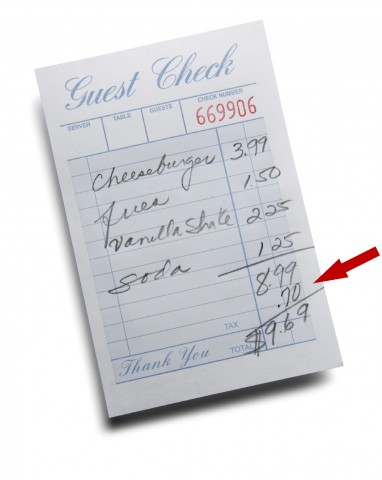
In the Czech Republic, service is always included.
B- Tipping in the Czech Republic
Customer service in the Czech Republic is very different from what you probably know from other countries––overly friendly and smiles are rare, and tipping is more about the actual service/food.
Bottom line: You do NOT have to tip.
If you decide to tip:
- ➢ You either tip a standard 10 percent or round up the check to the next hundred crowns––this is way more common here.
➢ If you’re paying by card or handing the waiter a larger note, always tell them how much you want to tip in advance.
➢ Using cash is becoming pretty rare.
➢ It’s not common to leave money (even if it’s just the tip) on the table.
➢ If you see a “Service is not included” note on your check, please remember that service is ALWAYS included (legally speaking), and you’re NOT obliged to tip if you don’t want to.
4. How CzechClass101.com Helps You Learn Czech in a Fun Way
That’s it, guys! I hope you enjoyed this article and maybe you even know how to say french fries in Czech (hranolky)! In case the location words and phrases listed in this article weren’t enough for you, and you want to keep learning, please check out our Basic Bootcamp – the very basic grammar and vocab in 5 compact lessons.
If you’re taking learning Czech seriously, and want to learn Czech fast, free and online, you might grab a Czech grammar book or learn online (which is way more convenient). Seriously, learning a new skill has never been easier. Just grab your phone and get to work!
CzechClass101.com will make learning Czech easy, exciting, and fun. With us, it’s not about endless memorizing or thick textbooks. Learn Czech the better way – with us you’ll make progress faster than you could imagine!
What can you find here?
- English to Czech translation and pronunciation tips/tricks
- Over 630 audio and video lessons
- Vocabulary learning tools
- Spaced repetition flashcards
- Detailed PDF lesson notes
Sign up now, it’s free!
One last thing: Let us know in the comments your funny restaurant stories (in Czech, of course). Which Czech phrase from this article will you use the most? We look forward to hearing your answers.

Czech Animal Words

Raise your hand if you like animals! Zvířata (“animals”) are awesome and necessary for so many reasons.
You’ll soon find out that if you want to speak Czech, you’re going to need to learn Czech animal names—even if you’re not a fur/feather/fish lover, you don’t intend to marry a Czech farmer, or you don’t want to talk about your mom’s private minizoo.
Why?
Let’s see: There is a mouse in my room! I am allergic to dogs. I hate fish; I only eat chicken. No, I can’t have that; there’s cow’s milk in it.
One of the first things Czech babies learn is animal sounds. Jak dělá kráva? Bů! (“What does a cow say? Moo!”). And since you should approach learning a new language just like that—as if you didn’t know any other language—let’s explore the Czech fauna together!
 Table of Contents
Table of Contents
- Pets – Mazlíčci
- On the Farm – Domácí zvířata
- Wild Animals – Divoká zvířata
- Aquatic / Marine Animals – Sladkovodní a mořské ryby
- Bugs and Insects – Hmyz
- Birds, Reptiles, and Amphibians – Ptáci, plazi, a obojživelníci
- Talking About Animals
- Animal-Related Idioms and Slang Expressions
- How CzechClass101.com Helps You Learn Czech in a Fun Way
1. Pets – Mazlíčci
More than 58% of us share our home with a pet, and this number is still growing. Have you been to the Czech Republic? If your answer is yes, I’m sure you’ve seen many sleepy figures out in the streets clad in PJs early in the morning or around nine p.m…walking their dogs. Roughly 40% of Czechs have a dog (or dogs), while 23% own a cat. We might seem tough, but we sure love our furry friends!
Let’s look at the most common pets in the Czech Republic:
| English | Czech |
| Cat | Kočka |
| Kitten | Kotě / Koťátko |
| Dog | Pes |
| Puppy | Štěně / Štěňátko |
| Hamster | Křeček |
| Guinea pig | Morče |
| Rat | Potkan |
| Mouse | Myš |
| Spider | Pavouk |
| Tarantula | Sklípkan |
| Chameleon | Chameleon |
| Parakeet | Andulka |
| Cockatiel | Korela |
| Parrot | Papoušek |
| Gerbil | Pískomil |
| Bunny | Králík / Králíček |
| Degu | Osmák degu |
| Fish | Rybička (literally: “tiny fish”) |
| Aquarium | Akvárium |
| Goldfish | Zlatá rybička |
| Tortoise | Želva |
| Turtle | Vodní želva |
| Snake | Had |

Cats and dogs are the most common Czech pets.
2. On the Farm – Domácí zvířata
I grew up in a small village. Everybody had chickens, geese, ducks, and other animals. I used to love collecting fresh, warm eggs, and I got bit by an angry goose (geese are very aggressive, beware!) several times. We had fresh cow milk from our neighbors, and I was always wondering why my grandpa’s bunnies kept disappearing (bless my ten-year-old heart).
Things are much different now. The typical Czech would rather go to the supermarket once a week and watch TV the rest of the time. Some people still have chickens, rabbits, or even a pig, but it’s rare.
One thing I’d like to point out: Many Czechs who speak basic English often confuse a “hen” and a “chicken.” Keep that in mind. Don’t be surprised if you get weird looks when you say, “My chickens lay four eggs a day.” Folks around here think that a “chicken” is either the cute little ball of yellow feathers or a neat package from the supermarket.
Also, there might be “hen soup” on the menu (delicious)—this is correct. Slepičí polévka or slepičí vývar (“hen soup/broth”) and kuřecí polévka or kuřecí vývar (“chicken soup/broth”) are two different things.
If you want to explore more, feel free to check out our lesson on farm animals.
| English | Czech |
| Cow | Kráva |
| Calf | Tele / Telátko |
| Goat | Koza |
| Kid | Kůzle |
| Pig | Prase |
| Piglet | Sele / Selátko |
| Rabbit | Králík |
| Duck | Kachna |
| Duckling | Káčátko |
| Goose | Husa |
| Gosling | House / Housátko |
| Horse | Kůň |
| Stallion | Hřebec |
| Mare | Kobyla |
| Foal | Hříbě / Hříbátko |
| Pony | Poník |
| Donkey | Osel |
| Sheep | Ovce |
| Ram | Beran |
| Lamb | Jehně / Jehňátko |
| Hen (Chicken) | Slepice |
| Rooster | Kohout |
| Chick | Kuře |
| Pigeon | Holub |
You can find the correct pronunciations, more vocab, and sample sentences on CzechClass101.com.

Sheep are quite common farm animals in the Czech Republic.
3. Wild Animals – Divoká zvířata
Although there are many gorgeous creatures roaming the Czech woods (I’m still talking about animals, not fairies), you’ll find some wilderness in the city as well. Sort of. You’ll definitely have a fair share of encounters with squirrels and pigeons.
I remember my first visit to London. It was a gorgeous sunny day, and my friend and I were walking through a park. I was 25 years old when I discovered that not all squirrels are red. In fact, none of the British ones were red. Czech squirrels, on the contrary, are mostly red.
Here’s a quick list of popular wild animals in the Czech language:
| English | Czech |
| Tiger | Tygr |
| Tigress | Tygřice |
| Lion | Lev |
| Lioness | Lvice |
| Lion cub | Lvíče |
| Elephant | Slon |
| Monkey | Opice |
| Gorilla | Gorila |
| Hippopotamus | Hroch |
| Rhinoceros | Nosorožec |
| Giraffe | Žirafa |
| Antelope | Antilopa |
| Penguin | Tučňák |
| Polar bear | Lední medvěd (literally: “ice bear”) |
| Fox | Liška |
| Wolf | Vlk |
| Bear | Medvěd |
| Wild boar | Divoké prase (literally: “wild pig”) |
| Deer | Jelen |
| Hare | Zajíc |
| Squirrel | Veverka |
| Beaver | Bobr |
| Weasel | Lasička |
| Otter | Vydra |

Wolves in the Czech Republic are endangered.
4. Aquatic / Marine Animals – Sladkovodní a mořské ryby
Since the Czech Republic isn’t a tropical paradise or a Scandinavian kingdom, the aquatic population of this lovely little patch in the heart of Europe isn’t very exciting.
The most common Czech fish is the carp, which also happens to be the traditional Czech Christmas food.
In case you’re struggling with pronunciation, you’ll find help here.
| English | Czech |
| Fish | Ryba |
| Freshwater fish | Sladkovodní ryba (literally: “sweetwater fish”) |
| Deep-sea fish | Mořská ryba |
| Salmon | Losos |
| Lobster | Humr |
| Shrimp | Kreveta |
| Seahorse | Mořský koník |
| Shark | Žralok |
| Dolphin | Delfín |
| Whale | Velryba |
| Orca | Kosatka |
| Pike | Štika |
| Catfish | Sumec |
| Carp | Kapr |
| Trout | Pstruh |
| Mackerel | Makrela |
| Starfish | Mořská hvězdice |
| Shellfish | Mušle |
| Oyster | Ústřice |
| Roe | Jikry |
5. Bugs and Insects – Hmyz
Here’s the good news: This country isn’t humid, plus it’s not Australia. If you’re not interested in meeting a giant spider or a bug that’s the size of your uncle Bob’s palm, you’ll love it here.
However, this country is not bug-free. Make sure you check out the list of six- (or more-) legged creatures below.
By the way, writing all these animal names in Czech made me realize something quite adorable:
“Nightmares” are called “night moths” in Czech (“nightmare” – noční můra).
| English | Czech |
| Bug | Brouk |
| Spider | Pavouk |
| Bee | Včela |
| Bumblebee | Čmelák |
| Wasp | Vosa |
| Ladybug | Beruška |
| Fly | Moucha |
| Firefly | Světluška |
| Moth | Můra |
| Butterfly | Motýl |
| Mosquito | Komár |
| Ant | Mravenec |
| Flea | Blecha |
| Cockroach | Šváb |
6. Birds, Reptiles, and Amphibians – Ptáci, plazi, a obojživelníci
I feel like the title suggests this is a list of prehistoric animals. No. It contains words that represent beautiful creatures that chirp, look cute, and defy gravity on a daily basis, and some other creatures that…well…are our friends, too.
Did you know that there’s only one venomous snake in the Czech Republic? An adder. The bite wouldn’t, like, kill you (unless you’re a baby, which, I suppose, you’re not), and adders are endangered and extremely timid. The only thing that could possibly scare you on your hike in the Czech Republic is the lack of trash cans.
Now, here are the most common birds, reptiles, amphibians, and similar members of the animal kingdom.
| English | Czech |
| Bird | Pták |
| Reptile | Plaz |
| Lizard | Ještěr |
| Swan | Labuť |
| Hummingbird | Kolibřík |
| Seagull | Racek |
| Dove | Hrdlička |
| Pigeon | Holub |
| Crow | Vrána |
| Raven | Krkavec |
| Eagle | Orel |
| Hawk | Sokol |
| Buzzard | Káně |
| Stork | Čáp |
| Peacock | Páv |
| Owl | Sova |
| Sparrow | Vrabec |
| Blackbird | Kos |
| Frog | Žába |
| Toad | Ropucha |
| Snail | Hlemýžď (terminus technicus) / Šnek (a colloquial word that most people use when talking about these slimy creatures with “a house”—domeček, which literally means “tiny house”) |
| Slug | Slimák |
| Crocodile | Krokodýl |
| Alligator | Aligátor |

Peacocks can be seen in most parks surrounding chateaus all over the country.
7. Talking About Animals
Now that you know the names of animals in Czech, let’s learn a few more useful animal words…
Animal Body Parts
| English | Czech |
| Beak | Zobák |
| Tail | Ocas |
| Horn | Roh |
| Antlers | Parohy |
| Fur | Srst |
| Feathers | Peří |
| Hooves | Kopyta |
| Mane | Hříva |
| Claws | Drápy |
Animal-related Verbs
| English | Czech |
| To scratch | Škrábat se |
| To bark | Štěkat |
| To meow | Mňoukat |
| To sing (chirp) | Zpívat |
| To bite | Kousat / Štípat |
| To peck | Zobat / Klovat |
| To dig | Hrabat |

Pes u veterináře. – “A dog at the vet.”
8. Animal-Related Idioms and Slang Expressions
The Czech language is very playful, and animal idioms are particularly popular. They’re fun, but let’s be honest: Any idiom might cause a lot of confusion, and possibly even an embarrassing situation.
Here’s a list of the most common ones.
|
|
|
|
|
|
|
|
|
|
|
|
|
|
9. How CzechClass101.com Helps You Learn Czech in a Fun Way
Stop trying to learn Czech. Learn Czech. Get smarter tools, study smarter, and believe in yourself. The sky’s the limit!
I hope you enjoyed this article and learned something new! In case this wasn’t enough for you, please check out our Basic Bootcamp—the very basic grammar and vocab you’ll need in five compact lessons.
If you’re taking your Czech studies seriously, you might grab a Czech grammar book or learn online (the latter of which is way more convenient). Learning a new skill has never been easier. Just grab your phone and get to work!
CzechClass101.com makes learning Czech easy, exciting, and fun. With us, it’s not about endless memorizing or thick textbooks. Learn Czech the better way—with us, you’ll make progress faster than you could imagine!
What can you find here?
- English-to-Czech translation and pronunciation tips/tricks
- Over 630 audio and video lessons
- Vocabulary learning tools
- Spaced repetition flashcards
- Detailed PDF lesson notes
Sign up now; it’s free!
One last thing: Let us know in the comments what your favorite animal is! Do you remember its name in Czech?

Czech Love Phrases: How to Say “I Love You,” in Czech

Falling in love is always good news, whether it’s with a person, a language, a new activity, or a car.
I recently started learning a new language and I was very surprised when I finished a lesson called The Most Important Norwegian Phrases, yet still didn’t know how to say “Hey, handsome,” or “Your place or mine?” That’s one of the reasons I’m excited to be writing this article. Love is awesome in any language, plus you’ll likely meet interesting people while traveling or moving to another country. It’s a good idea to cover all the bases!
Things like flirting or saying “I love you,” in Czech might be tricky for you as a foreigner, but I’m here to help! Expressing love is just as delightful as feeling it, so I’ll be sure to clue you in on everything you need to make the most of your moment.
Remember: In Czech, the verb “to love” isn’t as commonly used as it is in English, and people might be taken aback by your passionate love proclamation.
Generally speaking, Czechs aren’t the most lovey-dovey, cutesy nation in the world. Saying “I love you” is considered special, rare, and meant only for the right people and situations. The difference between “like” and “love” is as vast as the Grand Canyon.
So, how should you express your love in the Czech language or ask someone out?
Let’s look at Czech love phrases.
 Table of Contents
Table of Contents
- It All Starts with a Pick-up Line
- Serious Stuff: Taking Your Relationship to the Next Level
- Endearment Terms
- Czech Love Quotes
- How CzechClass101.com Can Help You Learn Czech in a Fun Way
1. It All Starts with a Pick-up Line
I distinctly remember that fateful summer night in 1999. While camping with my class, we found out there was a group of German boys staying at the campsite. We were 14 or 15 and eager to get to know each other.
Mind you, I went to a “good” school, and we had all been learning German and English since we were eight. Most of us were able to talk about our summer plans, introduce ourselves and our family, and apologize for not doing our homework in these languages. Yet, that night, something mind-blowing happened.
During an encounter with the boys, who looked so much more manly and interesting than our classmates (six insecure boys overwhelmed by a group of 25 young women with ambition), we realized our knowledge of German and English was horrifyingly insufficient.
The best I could do that night might well be one of the most interesting things I’ve ever said: “Your hand is like a baby’s…popo.” Popo means “butt.” I was trying to tell him that his hands were very smooth. Young love conquers even the toughest of language barriers though, and he kissed me anyway. Had my German been better, he might have actually talked to me and we could be married today. Who knows.
TLDR: Learn Czech pick-up lines, and don’t risk missing out on getting to know someone special!
Now, let’s get to business!
A- How to Start a Conversation in a Non-creepy Way

Ke mně, nebo k tobě? (“Your place or mine?”)
Let’s say you’re sitting in a café, plowing through work emails or reading a book…and the most beautiful creature enters the room. It doesn’t really matter where you are, the point is—you’re intrigued. What do you do?
Introducing yourself (preferably in Czech) seems like the most logical first step, right? In this article, you’ll find the necessary vocab and phrases for doing so. If you’re still struggling or short on time, memorize these lines.
After that, you’re ready to bond:
| Czech (M/F) | English |
| Chodíš sem často? | “Do you come here often?” |
| Dáš si drink? | “Would you like a drink?” |
| Zatancujeme si? | “Would you like to dance?” |
| Líbí se ti tady? | “Do you like it here?” |
| Bavíš se? | “Are you having fun?” |
| Jsi tu sám/sama? | “Are you alone here?” / “Did you come alone?” |
| Nenudíš se trochu? | “Aren’t you a bit bored?” |
| Můžu se k tobě přidat? | “Can I join you?” |
| Nemůžu z tebe spustit oči. | “I can’t take my eyes off of you.” |
One of these should work in any setting or situation, except for business meetings, doctors’ offices, and funeral homes.
Hodně štěstí! (“Good luck!”)
Note for men: Remember that Czech women aren’t as assertive/aggressive as you might expect, and it’s very likely that you’ll have to approach her, not the other way around.
B- Compliments
Alright. Everyone loves them, most of us don’t know how to accept them properly, and they work like a charm. Just don’t overdo it.
| Czech (M/F) | English |
| Jsi moc hezký/hezká. | “You’re very pretty.” |
| Jsi krásný/krásná. | “You’re beautiful.” |
| Moc se mi líbíš. | “I like you a lot.” |
| Jsi moc zajímavý/zajímavá. | “You’re very interesting.” |
And so on. Get creative and spontaneous. If you need inspiration, check out our list of compliments here and make sure you read our article on compliments as well. You might also find this list of 15 love phrases helpful.
C- When You Really Like Them and Want to See Them Again
Okay. You now know their name, you really like them, and a bunch of hyperactive butterflies are fluttering in your stomach. You might even suspect that never seeing this person again would make you think, “Man, what could have happened had I asked them out?” for the rest of your life. Remember Robert Redford in Indecent Proposal, and his story about a girl on a train? Don’t be like Robert. Ask them out.
Here’s what to say if you’d like to slide into their DM and/or explore the depths of their soul:
| Czech (M/F) | English |
| Můžu tě pozvat na večeři? | “Can I invite you to dinner?” |
| Nezajdeme někdy na drink? | “How about grabbing a drink someday?” |
| Dáš mi na sebe číslo? | “Can I have your phone number?” |
| Můžu ti zavolat? | “Can I call you?” |
| Zavolej mi. / Napiš mi. | “Call me.” / “Text me.” |
| Jsi single? | “Are you single?” |
| Jsi ženatý/vdaná? | “Are you married?” |
| Chodíš s někým? | “Are you dating anyone?” |
| Mám přítele/přítelkyni. | “I have a boyfriend/girlfriend.” |
| Šel/šla bys se mnou na rande? | “Would you go out with me?” |
| Moc rád/ráda bych tě znovu viděl/viděla. | “I’d like to see you again.” |
| Můžeme se někdy sejít? | “Can we meet up someday?” |
| Nemůžu se dočkat, až tě znovu uvidím. | “I can’t wait to see you again.” |
By the way, are you ready for a date in a restaurant? You might want to check out this list of lessons and learn how to order, ask for the bill, and impress your date with your slick language skills.
If you’re going to the movies, then study this list of movie-related Czech vocab beforehand. Also, make sure you know the necessary Czech vocab for making plans.
D- When You Want to Get Straight to the Point
Sometimes, you just know what you want when you see it, and there’s no point in sugarcoating it.
| Czech (M/F) | English |
| Čau krasavče/krásko. | “Hey handsome/beautiful.” |
| Nechceš jít na vzduch? | “Do you want to get some fresh air?” |
| Chci s tebou být sám/sama. | “I want to be alone with you.” |
| Můžu tě doprovodit domů? | “Can I take you home?” |
| Doprovodíš mě domů? | “Would you walk me/take me home?” |
| Chci tě. | “I want you.” |
| Můžu tě políbit? | “Can I kiss you?” |
| Přitahuješ mě. | “I am attracted to you.” |
| Jdeme ke mně, nebo k tobě? | “Your place or mine?” |
When You’re Not Feeling It (And Just Want to Get Out)
Okay, what if everything goes smoothly, but the date is underwhelming and you know you don’t want to take it any further?
Sometimes it just doesn’t work out, and sometimes it doesn’t work out so badly that you need to leave immediately.
Don’t worry, I’ve got you covered.

Vypadni. (“Get out.”)
When it’s time to face the music:
| Czech | English |
| Nefungovalo by to. | “It wouldn’t work.” |
| Hledám něco jiného. | “I am looking for something else.” |
| Nejsi můj typ. | “You’re not my type.” |
| Nemám zájem. | “I’m not interested.” |
| Nehodíme se k sobě. | “We’re not a good match.” |
2. Serious Stuff: Taking Your Relationship to the Next Level
Alright. Let’s say you’ve gotten to know each other better, you’ve grown close, and your affection is much deeper than the initial (and mind-blowingly blissful) sexual fascination. You’re in love.
It’s time to say those elusive, magical words.
Do You Like Them or Love Them?
In Czech, we don’t use the word “love” very often, and we certainly don’t shout “luv ya” over the shoulder when leaving for work or at the end of every single phone call. And it’s totally normal (yes, this is the norm) to never hear it from your parents, grandparents, or kids.
And this doesn’t apply only to relationships.
In Czech, you don’t say: Miluju tvoje šaty. (“I love your dress.”) You say: Líbí se mi tvoje šaty. (“I like your dress.”)
When expressing affection, we commonly use these words instead of milovat (“to love”).
- Líbit se (“to like”)
- Mít rád (“to be fond of”)
- The Czech phrase Miluju tě (“I love you”) is only used in romantic relationships and it’s not something you throw around like confetti.
Now, let’s look at some Czech love phrases:
| Czech (F/M) | English |
| Miluju tě. | “I love you.” |
| Mám tě rád/ráda. | “I am fond of you.” |
| Zbožňuju tě. | “I adore you.” |
| Nemůžu bez tebe žít. | “I can’t live without you.” |
| Chci si tě vzít. | “I want to marry you.” |
| Vezmeš si mě? | “Will you marry me?” |
| Chci s tebou strávit zbytek života. | “I want to spend the rest of my life with you.” |
| Jsi láska mého života. | “You’re the love of my life.” |
| Jsem do tebe blázen. | “I’m crazy about you.” |

Novomanželé. (“Newlyweds”.)
3. Endearment Terms
Czech is a fun and very flexible language that allows for the creation of cute words.
We use zdrobněliny (diminutive forms of a person’s formal name) and various pet names that might sound surprisingly obscene to the untrained ear.
- The most common ones are zlato, miláčku, and lásko.
We also love cukrbliky (“batting one’s eyelashes in a cute, flirty way”). Cukr means “sugar” and bliky means “blinks.”
I’ve included a list of Czech endearment terms in the 5th case—declined and ready to use.
| Czech | English |
| Prdelko | “Little butt” |
| Lásko | “Love” |
| Kočičko | “Kitty” |
| Zlato | “Baby” |
| Broučku | “Little bug” |
| Zlatíčko | “Sweetheart” |
| Miláčku | “Darling” |
| Drahoušku | “Darling” |

Jsi moje prdelka. (“You’re my little butt.”)
4. Czech Love Quotes
Alright friends, it’s time for a healthy amount of pathos! Here are two of the most common Czech love quotes/proverbs that capture the Czech nature perfectly.
| Láska prochází žaludkem. | “Love goes through your stomach.” |
| This is similar to the English phrase, “The way to a man’s heart is through his stomach.” | |
| Snesl bych ti modré z nebe. | “I would bring you the blue from the sky.” |
| This is like saying, “I would do anything for you.” | |
We’re tough cookies who like food and are capable of big things when we’re in love. See for yourself!
Also, if you’re feeling super-romantic, you’re going to fall in love with this list of Czech quotes about love.
5. How CzechClass101.com Can Help You Learn Czech in a Fun Way
That’s it, guys! I hope you enjoyed this article and learned something new!
If you’re taking your Czech studies seriously, you could grab a Czech grammar book or learn online (the latter of which is way more convenient). Seriously, learning a new skill has never been easier. Just grab your phone and get to work!
CzechClass101.com makes learning Czech easy, exciting, and fun. With us, it’s not about endless memorizing or thick textbooks. Learn Czech the better way—with us, you’ll make progress faster than you could imagine!
What can you find here?
- English-to-Czech translation and pronunciation tips/tricks
- Over 630 audio and video lessons
- Vocabulary learning tools
- Spaced repetition flashcards
- Detailed PDF lesson notes
Sign up now, it’s free!
One last thing: Let us know in the comments which of these love phrases in Czech was your favorite!

Why learn Czech? Here are 13 compelling reasons.

Let me ask you a question: When and why did you first think about learning Czech?
Are you planning to move here, do you want to get a job in Czechia, did you fall in love with a Czech (fun fact: I bet you know at least one Czech beauty—Czech women are considered very pretty, and Czech guys…well, they’re nice!), or are you trying to decide which Slavic language would be the most fun to learn?
Even if none of the above is your case, we’re going to discuss why you should learn Czech (at least the basics) if you want to spend more than a day here. Not everyone in Czechia speaks English, and locals highly appreciate friendly foreigners with cute accents. Besides, it would be nice to be able to order a beer after a long day of exploring the wonders of Prague, Brno, Český Krumlov, and other cool places, right?
Learning Czech is easier than you would think. Once you master the basics, the rest is a breeze.
In this article, I’m going to list the biggest reasons why you should learn Czech…starting now!
P.S.: I really wish the title could be 13 Reasons Why, but we’ve already covered Netflix/HBO & Chill in another article (also written by moi).

 Table of Contents
Table of Contents
- Czechia is a Tiny but Shiny Central-European Gem
- It will make learning other European and Slavic languages much easier.
- It will help you get a job or start a business.
- Not a lot of people in the Czech Republic speak English… Sorry.
- Czechia is a cool place to visit.
- Timetables and announcements…
- Czech people will appreciate it.
- …you will make friends easily.
- Your future in-laws will love you for it…
- It’s a cool and “interesting” language to learn.
- Understanding Czenglish will be easier for you…
- Once you’re past the tough beginning, your progress will be fast.
- Czech is pretty easy to learn.
- How CzechClass101.com Helps You Learn Czech in a Fun Way
1. Czechia is a Tiny but Shiny Central-European Gem
A- About Us
- ➢ Czech is the official language of Czechia, spoken by almost 96% of the population. It’s the mother tongue of about 12 million people, most of whom live in Czechia with approximately one million native Czech speakers living abroad.
- ➢ Czech belongs to the West Slavic group of languages. It’s very similar to the Slovak language; these two languages are mutually intelligible and you probably wouldn’t be able to tell them apart. Most Czechs and Slovaks understand both languages in their written and spoken form.
- ➢ The similarities are comparable to those of British English vs. American English (yes, I am aware it’s still English, but you know what I mean). Czech and Slovak do have different (although very similar) grammar, spelling, and pronunciation. In other words: The words might sound pretty much the same, but the spelling is completely different.
- ➢ It’s no surprise that Czech is also similar to other Slavic languages, such as: Bulgarian, Croatian, Polish, and Russian. If you already speak/study one of these, learning Czech will be a piece of cake.
B- The Basics
- ➢ The modern Czech language uses the Latin alphabet with diacritics (a.k.a. special characters) that alter their pronunciation. It’s a phonetic language, meaning that everything is pronounced exactly the way it’s written (i.e. UNLIKE English or French, JUST LIKE Spanish, Italian, Latin, et cetera/a tak dále).
- ➢ Czech consists of 26 Latin letters (the same as English), plus letters with special diacritic accents. There are three types of those accents: the acute accent čárka (length mark) for indicating the length of vowels, háček (hook) for changing the sound, and lastly kroužek (circle) indicating long pronunciation of the letter (u – ů). Altogether, the alphabet includes 42 characters.
- ➢ Once you learn the pronunciation of the whole alphabet, you’ll be able to read and pronounce any Czech word. There will be no surprises. (“Kansas-Arkansas, see-sea, to-too-two,” I’m looking at you!)
2. It will make learning other European and Slavic languages much easier.
- ➢ With advanced knowledge of Czech, you’ll be able to understand some spoken and written Slovak and Polish, as well as spoken Russian.
- ➢ You’ll be able to pronounce Italian/Spanish/Latin (big and smart) words correctly.
3. It will help you get a job or start a business.
Speaking the Czech language might bring you new business opportunities in Central Europe as well as new opportunities in other countries.
Oh, I’m happy where I am, I don’t need more opportunities…said no one, ever.
- ➢ The Czech industrial base is well-developed and there are tons of possibilities in the automotive industry, industrial machinery industry, mining, electronics, glass manufacturing, and beer production.
- ➢ Recently, high-tech industries have been on the rise and business opportunities are arising, particularly in the areas of aerospace, nanotechnology, and life science. If you’re an engineer, you might want to grab a Czech textbook or sign up for an online Czech class ASAP. According to some, Czechia is the ideal place for launching a new industrial revolution.
4. Not a lot of people in the Czech Republic speak English… Sorry, Karen.
In summer 2018, I spent a week with my American boyfriend’s family in a lovely little town in Tuscany. It was an incredibly picturesque place with a couple of restaurants, one little café, an incredibly blue sky…and a few thousand very Italian Italians who spoke only Italian. We were the only tourists there.
Yet, one of the family members was perplexed by this simple and natural occurrence, and stated: “They should speak at least SOME English.”
No, they shouldn’t.
Not cool.
Don’t be like them.
Please, never expect that everyone speaks or should speak your language, especially if you’re visiting their home country.
Learn some basic Czech phrases and vocab, and look into the pronunciation. Trust me, you’re going to need it.

You’ll fall in love with Prague even if traveling isn’t really your jam.
5. Czechia is a cool place to visit.
- ➢ Medieval architecture
➢ Modern architecture
➢ Great beer
➢ Cheap 5* hotels
➢ Prague is one of the most beautiful and magical places you’ll ever see
➢ Brno is cool
Need I say more?
Actually…
6. Timetables and announcements…
…of changes or delays are usually in Czech only. Unless you have a trusted native by your side, do your homework.
7. Czech people will appreciate it.
Trust me. You want them to like you. You want them to be on your side, because these hard-shelled people with hearts of gold will love you for your effort and for showing respect.
Which also means more doors will be open for you. Which leads to more-helpful officers, kinder staff in hotels, and so on. And also…

I wouldn’t call us patriots, but most Czechs will definitely appreciate your effort.
8. …you will make friends easily.
Or, you know, in case you’re dating a Czech, you’ll be able to tell if they’re whispering sweet nothings or deathly spells into your ear.
We all know how hard it is to truly connect if there’s a language barrier, and meeting a Czech who speaks English freely and fluently would be a small miracle.
Why not meet them halfway?
Learn how to introduce yourself in Czech, and here’s another article that breaks down the basic Czech grammar rules. You could also learn a few adjectives to describe your personality and words for talking about what you do.
Take it slow and enjoy the process—it will pay off!
9. Your future in-laws will love you for it…
…or hate you a little less. (I can’t even remember how many times I’ve heard: “Oh please, can’t you just find someone from around here?” I can’t, grandma, sorry not sorry.)
This is important.
If you want to impress your girlfriend’s/boyfriend’s relatives (especially grandparents) and avoid unnecessary tension, learn at least a few basic phrases.
10. It’s a cool and “interesting” language to learn.
Still scratching your head about why to learn Czech, especially when there are other (more popular) languages out there?
In a world full of “I’m learning French/Spanish/German,” be an “I’m learning Czech.”
I’m not saying you should ditch other languages, I’m simply suggesting you take a break from the classics and explore new possibilities.

Czech is a unique language, and doing a unique thing is always a good idea.
11. Understanding Czenglish will be easier for you…
…which will lead to smoother communication.
- ➢ Czenglish = English spoken by Czechs that is heavily influenced by Czech vocabulary, grammar, pronunciation, or syntax.
Basic knowledge of Czech word order and pronunciation will make it easier for you to figure out what your partner is trying to say.
12. Once you’re past the tough beginning, your progress will be fast.
- ➢ Czech grammar is very straightforward and gets easier as you work your way up to a higher level. Once you remember the patterns of word endings and cases, you’re fine. No surprises!
13. Czech is pretty easy to learn.
It takes around 12 weeks to reach the beginner level, which means you’ll be able to introduce yourself, know the basic grammar (tenses, basic vocabulary), and just get by. If you’re aiming higher, prepare to do about twice the work to reach the intermediate level (24 weeks).
- The vocabulary is simpler than that of English. It is, in fact, a subset of word roots, prefixes, and suffixes. Most of them are linked in easy-to-remember or logical ways.
- The feared declension (a.k.a. cases) isn’t as scary as it seems. You just need to memorize the endings of every noun/adjective and mind the gender. The stem remains unchanged (mostly).
- There are NO articles.
- There are only three tenses: past, present, future. Done.
Learning a new language is always a good idea, and not just for the practical reasons. It will also create a new routine and bring a new sense of accomplishment into your daily life. You’ll improve your memory, feed your brain and soul, boost your confidence, and gain perspective. You’ll feel great about yourself! And that’s the only thing that really matters.

Czech is way easier to learn than most people (who know such a language exists) think.
14. How CzechClass101.com Helps You Learn Czech in a Fun Way
That’s it, guys! I hope you enjoyed this article and learned something new!
If you’re taking your Czech studies seriously, you could grab a Czech grammar book or learn online (the latter of which is way more convenient). Seriously, learning a new skill has never been easier. Just grab your phone and get to work!
Wondering how to learn Czech online like a pro?
CzechClass101.com will make learning Czech easy, exciting, and fun. With us, it’s not about endless memorizing or thick textbooks. Learn Czech the better way—with us, you’ll make progress faster than you could imagine!
What can you find here?
- English-to-Czech translation and pronunciation tips/tricks
- Over 630 audio and video lessons
- Vocabulary learning tools
- Spaced repetition flashcards
- Detailed PDF lesson notes
Sign up now, it’s free!
One last thing: Let us know in the comments if this article helped you, and if you feel inspired to start (or continue) learning Czech now!

The Best Czech Proverbs

Ahhh, proverbs…those charming pieces of wisdom that add a nice ring (or a pitch of pathos) to any speech or article, and make you ultimately irritated in certain situations. Like right after you failed your adventurous challenge.
However, they’re also comforting. Knowing that people in the past have gone through the same stuff we’re dealing with now is encouraging. And that’s exactly how we should see proverbs: as little “hellos” from our ancestors, who created them as reflections of who we are and how we see the world, life, love, success…you name it.
This article about Czech proverbs and sayings will give you insight into not only the Czech language, but also the culture and mindset behind it. You might be surprised at how much proverbs vary from one country or culture to another.
Have you ever read or heard a Czech proverb? No? That’s okay…žádný učený z nebe nespadl (“no expert has ever fallen from the skies”). I hope that you’re a little confused and very curious now (and no, I did not get a stroke just now). I’m just giving you a little example.
In this article, I’ll explain the most common Czech proverbs in English. Let’s dive right into it!

Lépe pozdě než nikdy. / “Better late than never.”
 Table of Contents
Table of Contents
- Czech Proverbs About Money
- Motivational Czech Proverbs
- Czech Proverbs About Time
- Czech Proverbs About Attitude
- Czech Proverbs About Life
- Cool Czech Proverbs in English That Even Many Natives Don’t Understand
- How CzechClass101.com Helps You Learn Czech in a Fun Way
1. Czech Proverbs About Money
Believe it or not, there are plenty of Czech sayings out there on the topic of money. Here are just a few…
Odvážnému štěstí přeje.
- “Luck favors the brave ones.” / “Fortune sides with him who dares.”
This one is pretty straightforward, right?
Fun fact #1: This quote is actually from Virgil (the author of the Aeneid), but my nation seems to like it a lot.
Fun fact #2: Czechs aren’t the most courageous people in the world.
During the communist era (I’m going to repeat this a lot, bear with me), which ended “only” thirty years ago, it was much safer to keep quiet and remain unseen. Today’s kids are a whole different story, though: adventurous, ambitious, wordly.
Bez práce nejsou koláče.
- “Without work, there are no kolaches.”
No pain, no gain, guys. This one pairs great with…
Pečení holubi nelítají do pusy.
- “Baked pigeons don’t fly into your mouth.”
The Czech believe that if you want to achieve something, you have to hustle and work extra-hard. Every success has to be hard-earned. There have to be blood stains all over you.
Making money doing what you love? Pffft.
Making two dimes a week as a miner working twenty-hour shifts? Well done, buddy!
Czechs love their food, so don’t be surprised when you see them come up often in proverbs. Speaking of, what’s your favorite Czech food? And do you know how to order in a Czech restaurant?
Čas jsou peníze.
- “Time is money.”
The meaning of this one is pretty obvious: Don’t wait around if you could be making money instead.
Oh, just don’t talk about money in the Czech Republic. No figures. People might look at you funny if you ask them about their income, mortgage, debt, child support…just kidding.
However, there are some basic money-related Czech phrases that you’ll need for your everyday interactions. Check them out:
Zadarmo ani kuře nehrabe.
- “Chickens don’t dig for free.”
Knowing your worth and value sure is important. But this Czech proverb is more about…not doing stuff just out of the goodness of your heart.
Kdo šetří, má za tři.
- “Who keeps saving has more than three people combined.”
Okay, guys. I do agree it’s important to save some bucks for a rainy day, but saving can get out of hand too! Don’t forget that your happiness and well-being are way more important, so don’t deny yourself the opportunity to use your own money on stuff that makes you happy!
This proverb doesn’t apply to money exclusively, and it comes from the old dark times when people ate artificial “honey” and didn’t know when the local store would restock on toilet paper, so…they stocked up on it, and saved it. (True story.)

Sometimes, money CAN buy happiness.
2. Motivational Czech Proverbs
We could all use some motivation now and then, whether to lift our spirits…or to lift our bums off the sofa. Here are a few of the best Czech proverbs to do just that!
Co můžeš udělat dnes, neodkládej na zítřek.
- “Never put off till tomorrow what you can do today.”
If you want to do something, do it right away. Like… The last piece of cake in your fridge might as well be eaten tonight, don’t you think?
Malé ryby taky ryby.
- “Even small fish are fish.”
Here we go again: the communist era (you can learn more about the Czech history after WWII here). Here’s what I genuinely enjoy about my people—we can appreciate the little things in life. Even small victories count, you know?
Opakování matka moudrosti.
- “Repetition is the mother of wisdom.”
A.k.a. “Repetition is the mother of all learning.” If you want to create new neural paths, repeat the thing you want to learn until it becomes second nature.
S poctivostí nejdál dojdeš.
- “Honesty is the best policy.”
Being truthful is a virtue. Just don’t overdo it, please.
Last weekend, my grandma was being very honest and shrieked: “You look pregnant!”
I’m not pregnant.
Naděje umírá poslední.
- “Hope dies last.”
…for hope to even possibly die is for there to be nothing else left.
3. Czech Proverbs About Time
Time affects literally every aspect of our lives, so it should come as no surprise that there are a number of proverbs on the topic…
Nač stahovat kalhoty, když brod je ještě daleko?
- “Why put your pants down while the ford is still far away?”
As in: Everything in due time. Also, the proverb’s delicately hinting that you’re going to “use the bathroom” someplace safe near the ford.
By the way, before your trip to CZ, make sure you know how to ask where the nearest bathroom is—not a lot of people speak English!
Co se v mládí naučíš, ve stáří jako když najdeš.
- “What you have learned young you’ll find useful in the old.”
My grandma was probably taught to be extremely honest. Don’t be like grandma, and focus instead on learning skills that don’t traumatize other people, please.
Ráno moudřejší večera.
- “The morning is wiser than the evening.”
You know how sometimes you can’t sleep because your mind is racing, you get anxious, and everything seems so difficult and hopeless…and then in the morning you feel much better even though nothing has changed?
Or! Have you ever made a decision too fast and regretted it later?
These are great examples of what this proverb is referring to.
Don’t rush yourself. Sleep on it (literally or figuratively). Give yourself time to think things through. You’ll be wiser in the morning.
Ranní ptáče dál doskáče.
- “The early bird will hop further (gets the worm).”
No wonder all the billionaires and CEOs get up at four a.m., right?
It’s totally okay to sleep in, but if you get a head-start, you’ll get more done!
Starého psa novým kouskům nenaučíš.
- “You can’t teach an old dog to perform new tricks.”
My friend recently said this to me with a frustrated sigh and then took a sip of her wine.
Meaning: People who have been doing something a certain way for a very long time, most likely won’t change their routine just because you want to get married and move in together. Oh, the second part is totally just an example.
Trpělivost růže přináší.
- “Patience brings roses.”
And maybe, if you’re patient enough, he’ll finally produce a ring. Eventually. If you’re patient enough.
Okay, seriously. This proverb carries a message about “everything in due time.” So don’t try to rush things. Trust it will happen, and it’s yours.
4. Czech Proverbs About Attitude
They say that attitude is everything. But what exactly does that mean?
Zlost je špatný rádce. / Mluviti stříbro, mlčeti zlato.
- “Anger is a bad advisor.” / “Speaking is silver, silence is gold.”
These two proverbs urge us to be careful about what we say in anger, because people can’t unsee or unhear things. Next time you’re tempted to scream your lungs out or say something nasty, take a deep breath first.
Dobrá rada nad zlato.
- “Good advice is more valuable than gold.”
IMO, sometimes good advice even YIELDS gold.
Kdo jinému jámu kopá, sám do ní padá.
- “He who digs a hole for someone will fall in it himself.”
Karma’s a b*tch! Be nice and nice things will come to you. Dig holes and you’ll end up with both legs broken.
Darovanému koni na zuby nekoukej.
- “Don’t look a gift horse in the mouth.”
Accept gifts graciously, and don’t question their value. I mean…who doesn’t like free stuff, right?
- → Attitude and personality often go hand-in-hand. If you would like to learn how to describe your personality in Czech, see our list of adjectives and go through this lesson!
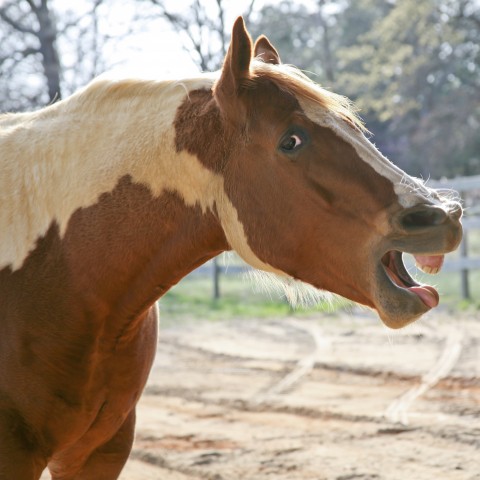
Darovanému koni na zuby nehleď.
5. Czech Proverbs About Life
We all want to live the best life possible, right? But it’s not always that easy. Here are some Czech proverbs that might help you, though!
Nehas, co tě nepálí.
- “Don’t fight a fire that’s not burning you.”
Mind your business. Did you know that Czechs are known for not giving an F? That’s why we often seem disinterested, cold, or rude (even though we’re dying to engage on the inside).
Sytý hladovému nevěří.
- “The sated/full doesn’t believe the hungry.”
If I told you that Czech is totally easy, and that if you’d started studying it a couple weeks ago, you should be fluent by now…would you believe me?
And if you told me that Czech is so hard, almost impossible to learn…would I believe you?
Now who’s the sated one?
Dvakrát měř, jednou řež.
- “Measure twice, cut once.”
The meaning of this one is obvious. Be careful and do all the preparations carefully. (Sometimes it’s called procrastination.)
Co zaseješ, to sklidíš.
- “You reap what you sow.”
Ever heard about karma?
Pes, který štěká, nekouše.
- “A dog that barks doesn’t bite.” / “Someone who makes threats all the time seldom carries out the threats.”
Except for the angry, tiny dogs—those always bite!
The actual meaning of this proverb is: Even if something seems intimidating/scary/too much/too loud, don’t get put off or scared. It’s likely just a facade.
Kdo uteče, vyhraje.
- “He who runs away, wins.”
Sometimes, it’s wiser to give up and walk away from a situation if you think you can’t win.
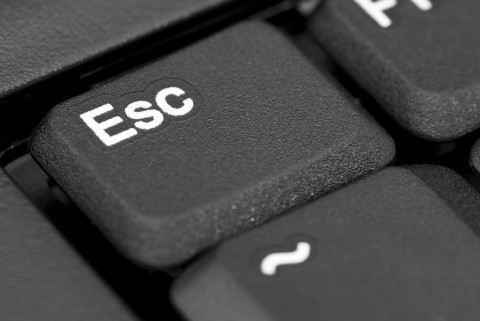
Kdo uteče, vyhraje.
6. Cool Czech Proverbs in English That Even Many Natives Don’t Understand
…but really, who understands all the proverbs in their language?
Jednou za Uherský rok.
- “Once in a Hungarian moon.”
This is equivalent to “once in a blue moon” or “very rarely.” Nobody knows what Hungary has to do with it.
Házet flintu do žita.
- “Throwing your rifle in the rye.”
To throw in the towel, especially after a long fight that seemed to be going nowhere.
Má máslo na hlavě.
- “He has butter on his head.”
This refers to when someone is hiding a lot of secrets (very obvious things) that everybody knows about (a.k.a. “has skeletons in his closet”).
Why butter? Who knows! We like butter. Butter is life. Butter is the Czech cream cheese and peanut butter in one.
V noci je každá kočka černá.
- “Every cat is black at night.”
When you can’t see things clearly, everything might seem the same to you.
Nedráždi hada bosou nohou.
- “Don’t pat a snake with bare feet.”
A.k.a. “walking into the lion’s den.” It’s a fun phrase, considering there are basically no venomous snakes in the country.

Don’t pat a snake with bare feet!
7. How CzechClass101.com Helps You Learn Czech in a Fun Way
I hope you enjoyed this article and learned something new! Which of these Czech proverbs can you most relate to?
If you’re taking your Czech studies seriously, you basically have two options: grab a Czech grammar book or learn online (the latter of which is way more convenient).
CzechClass101.com makes learning Czech easy, exciting, and fun. With us, it’s not about endless memorizing or thick textbooks. Learn Czech with us and make progress faster than you could imagine!
What can you find here?
- English-to-Czech translation and pronunciation tips/tricks
- Over 630 audio and video lessons
- Vocabulary learning tools
- Spaced repetition flashcards
- Detailed PDF lesson notes
Sign up now—it’s free!
One last thing: Let us know in the comments if this article helped you. Let’s get in touch!

Prague Travel Guide: The Top 10 Places to Visit in Prague

Not many people know where the Czech Republic is (I don’t blame them: it’s a tiny country hiding between two giants, Germany and Poland), but everyone knows someone who has been to Prague.
I’ve lost count of how many people who, upon learning where I come from, have shrieked in excitement: “My neighbor’s nephew visited Prague! He said it was such a lovely city! We must go someday, too!”
Believe it or not, Prague is just as exciting and has the same old-timey atmosphere as other, more “famous” European cities. It looks similar, and (for now) Prague travel is more affordable than travel in many other European cities. That’s why it’s a loved and popular destination not only among tourists, but also among many movie-makers.
Are you familiar with the films Blade II (2002), Hellboy (2004), or Mission Impossible (1996)? Then you’ve kind of seen Prague already. In the 2006 movie The Illusionist with Ed Norton, Prague filled in for late-nineteenth-century Vienna. A huge chunk of Casino Royale (2006) was shot in various Czech locations: Prague, Loket Castle, and Prague Airport (which filled in for Miami International).
Prague, the seat of medieval Bohemian kings, is a small yet charming jewel in the heart of Europe. Even those who don’t care about history or architecture will most definitely be smitten with its ancient bridges, squares, churches, cobblestone streets and, of course, the breathtaking view of the largest castle in the world, standing proudly above the river.

The largest castle in the world, covering 18 acres.
Are you ready to pack your bags?
In this Prague travel guide from CzechClass101.com, we’ll help you make the most of your trip by answering such questions as:
- When is the best time to visit Prague?
- What are the places to visit here?
- Is it worth visiting Prague Castle?
- Is Prague a safe city to visit?
We’ll cover this and more in our article!
- → First, you may want to study our list of the Top 30 Czech Travel Phrases You Should Know.
 Table of Contents
Table of Contents
- Before You Go: Basic Info About Prague
- Must-See Places for a 1-3 Day Trip to Prague
- Not Leaving Yet? Places for a 4-7 Day Trip (or Longer)
- Czech Survival Phrases for Travelers
- How CzechClass101.com Helps You Learn Czech in a Fun Way
Before You Go: Basic Info About Prague
As mentioned, Prague is one of the best-preserved cities in Europe and it will transport you right back to the seventeenth century. I’m sure you’ve heard quite a lot about this charming City of a Hundred Spires, but you’ll need some practical info as well while planning a visit to Prague.
Population
With around 1.3 million inhabitants, Prague is the largest city in the country by population. The population is spread over ten different districts within the city, and it’s densest in the center and southern areas of Prague.
Weather
If you’re wondering when to visit Prague for the best experience, keep in mind that the Czech Republic has a continental climate. That means…
- …mild, humid summers with occasional hot spells.
- …cold, cloudy, and humid winters with temperatures often below freezing.
- …lots of sun all year round.
You can visit any time of the year, though mid-April to September or mid-October would probably offer the most pleasant, sunny weather.
If you’re excited to see all the gems covered in snow, you might be disappointed—snow is sparse in the Czech Republic (except for in the mountains, of course).
- → Do you know how to ask about the weather in Czech? You can start by learning how to say the Top 15 Weather Conditions!
Travel Tips + Packing Reminders
Prague (and the Czech Republic in general) is still considered a budget-friendly destination, although it’s not “Eastern European cheap” like, well…Eastern Europe, Budapest, or Bratislava. Most decent hotels don’t charge more than 2.000 CZK (just below $100), and if you want to splurge and enjoy the comfort of a five-star hotel, it’ll cost you about twice as much.
As for meal prices, they won’t break the bank either. A dinner for two, including drinks, is usually around 700 CZK ($30, give or take).
Additional reminders:
- You’re going to need a type E socket, and don’t forget that your U.S. gadgets (like clippers or hair dryers) will get fried if you try using them in the Czech Republic—trust me, been there, done that.
- Most supermarkets, hotels, restaurants, and other tourist attractions accept euros. While you can use your card, it’s a good idea to bring some cash just in case.
- The Czech Republic is in GMT+2 time zone.
- Most people do NOT speak English. Our Czech Key Phrase List will come in handy in a pinch.
- If you’re not sure how to pronounce the names of the attractions you want to visit, feel free to use our list of Tourist Attractions in the Czech Republic!

Type E socket.
Must-See Places for a 1-3 Day Trip to Prague
If you don’t have a lot of time to visit Prague, one to three days should be enough for you to see the medieval city center, museums, and churches.
Here’s what you shouldn’t miss:
Day 1
Old Town (Staré město)
You do not want to miss the amazing, incredible astronomical clock (orloj) installed in 1410. It’s the third-oldest astronomical clock in the world and the oldest clock still operating. But there’s one problem: The Old Town Square (Staroměstské náměstí) is always crammed with people. Here’s my little tip:
Get there early in the morning, definitely before eight a.m. Grab a cup of Starbucks, enjoy the fun performance, have breakfast (and make sure you know how to order it), send a video of the dancing figures to your friends with a funny caption (every hour, two doors above the clock open and the twelve apostles on a rotating platform send you their blessings, one after another, followed by prejudices and other still or moving figures). And then, go on with your day in Prague.
Charles Bridge (Karlův most) and Old Town Bridge Tower (Staroměstská mostecká věž)
Charles Bridge was built in the early fifteenth century and crosses the river Vltava. It’s one of the most famous places in Prague, and for good reasons! If you love late-night walks, even better. You can enjoy your stroll without other tourists trying to snap a pic, and truly savor the beauty and the magical, medieval atmosphere.
Walking through the tower will make you feel like a celebrity—it was reserved for Bohemian kings to pass under during their coronation.

Charles Bridge is named after the Emperor Charles IV.
Church of Our Lady Before Týn (Chrám matky Boží před Týnem)
This church is sort of like Sagrada Familia in Spain, just a lot older. It’s gorgeous on the outside, and absolutely breathtaking on the inside—the two buildings do not look similar in any way. Just sayin’.
It was built in the fourteenth century during the Charles IV era, and 400 years later, the interior was renovated in the opulent Baroque style while the spiky exterior remained in Gothic style.

This beauty can be seen from many vantage points.
Day 2
Prague Castle and Hradčany (Pražský hrad a Hradčany)
Do yourself a favor and save a full day for this. This complex of buildings from the ninth century might make your feet beg for a day off, but there’s just so much to see here!
Here’s what you don’t want to miss while visiting Prague Castle:
- Column Hall (Sloupová síň)
- Spanish Hall (Španělský sál)
- Vladislav Hall (Vladislavský sál)
- St. Vitus Cathedral (Katedrála svatého Víta, Václava a Vojtěcha)
- St. George’s Basilica, Prague (Bazilika svatého Jiří) and St. George’s Convent, Prague (Klášter svatého Jiří), the oldest surviving church within Prague Castle.
- Golden Lane (Zlatá ulička)
- Royal Garden of Prague Castle (Královská zahrada)
Because of the constant rebuilding at Prague Castle, the structure represents almost every architectural style from the last millenium. St. Vitus Cathedral is an example of the Gothic style, while the Basilica of St. George and some of the palaces were built in the Romanesque style. The castle is open to tourists and is home to the National Gallery’s collection of Bohemian mannerism and Baroque art, as well as other museums. The annual Summer Shakespeare Festival also takes place at Prague Castle.
As mentioned, this is the largest castle complex in the world. Wear comfy shoes, guys!
Day 3
Alright, I’m guessing that by now you’re ready for a break. That’s what the New Town is for!
New Town (Nové město)
The name is pretty self-explanatory, so I’m just going to say that Nové město has a lot to offer, even for shoppaholics and art-lovers.
Wenceslas Square (Václavské náměstí)
Saint Wenceslas Square is one of the main Prague squares, and it’s very close to the main train station. If you love bars and parties, this is the place to go unwind after a long day of discovering Prague’s historical jewels.
Dancing House (Tančící dům)
This building, named after Fred Astaire and Ginger Rogers, was built in 1996. Its unique design is considered controversial because it’s located among Art-nouveau, Baroque, and Gothic buildings.

Tančící dům.
Powder Tower (Prašná brána)
This impressive building was built in the late fifteenth century, meant to be an impressive entrance to the city. Wondering why “powder”? It was used for gunpowder storage in the seventeenth century.
Not Leaving Yet? Places for a 4-7 Day Trip (or Longer)
Will you have more time to spend exploring Prague? Great! This will give you ample time to see even more of the city’s major attractions.
Day 4
Malá Strana
The name literally means “Little Side.” How adorable is that? You’ll find a lot of cute narrow cobblestone streets, numerous churches, little shops, and…
Petřín
This park on a hill in the center of Prague is an amazing place for walks and taking in the gorgeous views of the city. Also, if you’re going to propose while in Prague, I suggest you do it here.
I know you’re probably tired, but remember that 15k steps is the new 10k. So brace yourself and climb up the Petřín Lookout Tower (Petřínská rozhledna). The view will be worth it.
Days 5-7
Okay, maybe you’re ready to explore outside of the city center, too! Take a day trip. You’ll see more and let your mind rest a little.
Here are a few things you might want to see:
Vyšehrad
Vyšehrad was the royal residence of the Czech kings until the early twelfth century when they moved to the new, modern Prague Castle downtown.
Do not expect to find a perfectly intact castle here (okay, it’s ruins), but the views of the city are spectacular.
If you’re tired of spending all day in crowded places, Vyšehrad might be your jam: it’s one of the few parts of Prague that isn’t packed with tourists.
Karlštejn
This fourteenth-century castle up on a hill in the middle of the woods looks like something straight from a fairytale. It’s only a thirty-minute drive from Prague, and you can also take a train to reach this location.
The Pilsner Urquell Brewery in Plzeň
I’m pretty sure you’ve heard of this beer at some point in your life, just like we’ve all heard of Kleenex.
In just over an hour, you’ll get to the birthplace of modern lager. If you decide to stay overnight, you can have a lot of fun taking a tour of Pilsen pubs and enjoying not just the beer, but also the Czech food!
Czech Survival Phrases for Travelers
I highly recommend getting your language skills up to date before you leave, because not a lot of Czechs speak English. Feel free to Czech out our vocabulary lists.
What words and phrases will you need the most during your stay in Prague? We’ve got you covered!
| English | Czech |
| “Hello.” | Dobrý den. |
| “Thank you.” | Děkuji. |
| “Goodbye.” | Nashledanou. |
| “Sorry.” | Pardon. |
| “Very good.” | Moc dobré. |
| “I don’t understand you.” (to locals who don’t speak your language) | Nerozumím vám. |
| “Where is the restroom?” | Kde jsou toalety? |
| “How much is it?” | Kolik to stojí? |
| “I want this.” (while shopping or ordering food) | Vezmu si tohle. (while shopping) / Dám si tohle. (while ordering food) |
| “Help!” | Pomoc! |
Want more? Then see our list titled Don’t Travel Without Knowing These Top 10 Czech Verbs!
How CzechClass101.com Helps You Learn Czech in a Fun Way
That’s it, guys! I hope you enjoyed this article and learned something new!
If you’re taking your Czech studies seriously, your two main options are to grab a Czech grammar book or learn online (the latter of which is way more convenient).
CzechClass101.com will make learning Czech easy, exciting, and fun. With us, it’s not about endless memorizing or thick textbooks. Learn Czech with us and make progress faster than you could imagine!
What can you find here?
- English-to-Czech translation and pronunciation tips/tricks
- Over 630 audio and video lessons
- Vocabulary learning tools
- Spaced repetition flashcards
- Detailed PDF lesson notes
Sign up now—it’s free!
One last thing: Which of these Czech travel destinations are you most excited to see, and why?

English Words in the Czech Language

Czenglish. Have you ever heard this term? It’s been a hot topic lately, mostly due to the vigorous power of the internet and social media. Nowadays, everybody loves YouTube, TikTok, Instagram, and…influencers!
Although you won’t find a lot of similarities between Czech and English (with the exception of words derived from Latin), English is seeping into the Czech language more and more.
By the way, the phenomenon of English words used in Czech is not as new as it might seem! I was watching a Czech comedy from 1938 a couple of days ago, and one of the first scenes is a perfect example of Czenglish used in real life: Já changuju subject? Ty changuješ subject! (“I am changing the subject? You are changing the subject!”). We like using English words. We adopt them, lovingly decline and conjugate them, adjust the pronunciation to our liking, and make them our own.
Yup, it’s very convenient to speak more languages because (besides other, more prominent and useful advantages) it gives you the option to pick your favorite words and use them as you please! I am guilty of using English words in Czech convos, and it makes my grandma very confused at times!
There are also words that you probably consider English…which are actually Czech!
Let’s get into it! In this article, we’ll look at Czech words you’ve been using without realizing it, Czenglish, and Czech words of English origin.

I’ll make sure I never make this mistake again.
 Table of Contents
Table of Contents
- Introduction to Czenglish
- Czenglish Examples
- Loanwords vs. Czenglish: List of English Words in the Czech Language
- Foreign Brands, Titles, and Names in Czech
- Czech Words in English: Did You Know?
- How CzechClass101.com Can Help You Learn Czech in a Fun Way
Introduction to Czenglish
The term ‘Czenglish’ was first introduced in 1989 by Don Sparling, a Canadian professor at the Masaryk University in Brno (1977-2009), who’s also the author of English or Czenglish?
So, what is the definition of Czenglish?
- ➢ Czenglish is a version of the English language spoken by Czech learners of English. It is heavily influenced by Czech vocabulary, grammar, pronunciation, or syntax.
Czenglish mistakes might include a wide variety of “abominations,” such as:
Incorrect pronunciation
For example:
- /θ/ is often pronounced as [s], [t], or [f].
- “Thing” in Czech sounds more like “sink,” “tink,” or “fink.”
- /ð/ is often pronounced as [d].
- “They” is pronounced “dey.”
- /r/ has the typical rolling rumble to it.
Voiced consonants pronounced as unvoiced
Voiced consonants (B, D, G, J, L, M, N, Ng, R, Sz, Th as in “they,” V, W, Y, and Z) are made by vibrating the vocal cords. Unvoiced consonants…yes, you guessed it! Your vocal cords can take a break while pronouncing these: Ch, F, K, P, S, Sh, T, and Th (as in “thing”).
Czech natives, however, often pronounce them incorrectly. Which is no biK deal, but it sounds funny. I’m sure you’ve hearT a lot of Dose. Am I rrrright?
Omission of articles
It’s no wonder Czechs make this mistake, as there are no articles in the Czech language. Most Czech natives find them…redundant. Why bother, when it’s just a few letters (or even a single one)? Another thing you might encounter while talking to Czechs is the use of “some” in place of an indefinite article.
Literal translations
This is a big one. And given the stark difference between the Czech and English word order, there’s a good chance you’ll get lost in translation quite often.
Czenglish Examples
This part should be easy to write since I’m the “uncrowned queen of Czenglish” and sometimes it’s hard for my mouth to keep up with my mind, so…here it goes.
- “Basic school”
Got it? Basic school is the literal translation of základní škola (“elementary school”). I’ve heard this one way too many times to ever forget it. Základní means “basic” in Czech.
- “She said me that my English is great!”
Řekla mi, že moje angličtina je skvělá!
While in English, you might say “She said to me that my English is great,” omitting prepositions is very common in word-for-word translations. It can lead to some very funny situations…
- “I am watching on TV.”
Dívám se na televizi.
Generally speaking, the Czech language uses prepositions where English doesn’t, and vice-versa. Na means “on.”
- “Riding on bike”
Jet na kole.
This is a perfect example of preposition errors in literal translations.
- “I can English.”
Umím anglicky.
Mluvit means “to speak.” In Czech, we don’t say: Umím mluvit anglicky.
- A: “Hey, I don’t like it.” / B: “Me too.”
A: “Hele, nelíbí se mi to.” / B: “Mně taky.”
Shrug. That’s how Czech works, folks!
- Using the word “please” instead of “ask”
Oh my gosh, this mistake can actually be pretty embarrassing because “to please” has a very different meaning in English, and it’s similar to the Czech potěšit (“to make happy”). Not cute.
Poprosit (“to ask”) is derived from the word prosím (“please”), and for the average Czech, it totally makes sense to “please you to do something.”
To give you an example, the sentence Poprosil mě, abych něco řekl (“He asked me to say something”) would be incorrectly translated as “He pleased me to say something” (Potěšil mě, abych něco řekl).
I suppose you’ll want to avoid such mistakes in Czech! That’s why you should check out our list of 100 Core Czech Words and Key Czech Phrases!

Some Czenglish words sound adorable.
Loanwords vs. Czenglish: List of English Words in the Czech Language
Loanwords are “borrowed” from English without significant changes and tend to be easily understood by native English speakers.
This phenomenon has grown in popularity due to YouTube and social media, and we often use social media-related terms without changing them. However, we apply declension and conjugation in order to make them work in a Czech sentence.
We do use heavily altered (or even pure Czech) words when talking about technology, though. Check them out here.

Young Czechs use a lot of English words, mostly due to social media and influencers.
Here are some commonly used English words in Czech:
- Blog / blogging / blogovat (“to blog”)
- the noun is declined as masculine inanimate
- Lobbing
- masculine inanimate
- Barman (“bartender”)
- masculine animate
- This one only works in masculine, though. We like to be super-specific with grammatical gender, so the feminine version is barmanka.
- Blok (“block”), blokovat (“to block”)
- masculine inanimate
- Sendvič (“sandwich”)
- masculine animate
- Galon (“gallon”)
- masculine inanimate
- Klub (“club” as in “facility”)
- masculine inanimate
- Svetr (“sweater” or “jumper”)
- masculine inanimate
- Followers / followeři
- masculine animate
- Views
- not declined
- Stories (as in “Insta stories”)
- not declined
- Intro
- Trailer (as in a movie trailer)
- masculine inanimate
- Internet
- masculine inanimate
- Web (pronounced with a “v”)
- masculine inanimate
- Chat (when referring to an online conversation)
- masculine inanimate
- Email
- masculine inanimate
- Smartphone
- masculine inanimate
- Spoiler
- masculine inanimate
- Korporát (“corporate”)
- Brainstorming
- masculine inanimate
- Mainstream
- masculine inanimate
- Steak
- masculine inanimate
- Filet (“fillet”)
- masculine inanimate
- Cheesecake
- masculine inanimate
- Cupcake
- masculine inanimate
- Cookie
- neuter
- Brownie
- neuter
- Manager
- masculine animate
- Management / Marketing
- masculine inanimate
- Business
- masculine inanimate
Please note:
- ➢ All loanwords, even those that remain unchanged, are pronounced the Czenglish way and you might not recognize them when you hear them…
Just sayin’.
You might have noticed that a lot of these borrowed words are office- or work-related. But you’ll still need to know some Czech vocabulary to talk about your workplace!
Foreign Brands, Titles, and Names in Czech
There is one thing that technically doesn’t belong to Czenglish, but I get asked about it A LOT.
Angela MerkelOVÁ
Sigourney WeaverOVÁ
Anna BoleynOVÁ
In Czech and other Slavic languages, the suffix -ová is added to the last names of all females. Back in the day, it literally meant “belonging to…,” and somehow, it never went away. Are you wincing now?
Lately, more women choose to go by their husband’s last name without the -ová, which means they have to literally lie to the authorities when applying for their new documents. You have to confirm that you’re either going to move abroad or have married a foreigner in order to be allowed to choose your own name. I’m not kidding.
There’s one advantage to this whole “belonging to” thing: it makes it clear whether a person is male or female immediately.
Now back to Czenglish!
Do we translate foreign titles? Yup. Some of them. Any rules? No.
Look:
- Star Wars – Hvězdné války (literal translation, same meaning)
- Pretty Woman – Pretty woman
- Misson: Impossible – Mission: Impossible
- Inception – Počátek (literal translation is “beginning,” but vnuknutí [meaning “suggestion”] would be more accurate)
However, titles are created based on specific instructions from Hollywood headquarters before the creators have seen the actual movie, which definitely makes the job harder.
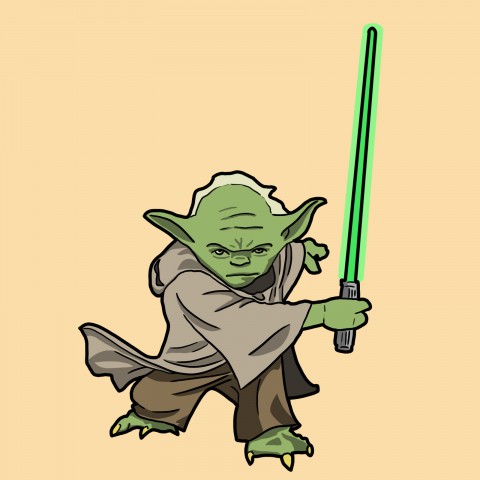
Hvězdné války – Yoda.
P.S.: We also omit the ‘90210’ from Beverly Hills, 90210 and pronounce Nike as Nik.
By the way, if you’re going to the movies in the Czech Republic, check out our specialized movie vocab list first!
Czech Words in English: Did You Know?
There are words you probably consider English, but…
Bohemisms or Czechisms are words derived from the Czech language, and many of them originate in Latin. Let’s look at a couple of English words from Czech you’ve heard at least once before:
Robot
This word was first coined by the Czech playwright, novelist, and journalist Karel Čapek (1880-1938), who introduced it in his 1920 sci-fi play, R.U.R., or Rossum’s Universal Robots. It’s derived from the old Slavonic word robota, which literally means “forced labor.”
Čapek first named these creatures laboři, but didn’t really like it. At the suggestion of his brother, artist and author Josef Čapek, he later opted for roboti (“robots”).

Robot or labor?
In case you’re interested: The play is pretty awesome, and there’s an English version as well. It’s pretty ironic that R.U.R. was his least favorite work.
By the way, Čapek was close friends with the first Czechoslovak president, a passionate democrat (although he wasn’t directly involved in politics), and strictly against totalitarian regimes. Some of his works were considered “subversive,” and as such, were hated by the rising Nazi party. He died of the flu in December 1938.
Polka
This popular folk dance (and the word used to describe it) originated in the mid-nineteenth century. It’s drawn from the word půlka (“half”), and refers to the short half-steps and rhythm of the dance.
The word became widely popular in the major European languages in the early 1840s.
How CzechClass101.com Can Help You Learn Czech in a Fun Way
That’s it, guys! I hope you enjoyed this article and learned something new! Did any of the words we listed surprise you?
If you’re taking your Czech learning seriously, you could grab a Czech grammar book or learn online (the latter of which is way more convenient).
CzechClass101.com will make learning Czech easy, exciting, and fun. With us, it’s not about endless memorizing or thick textbooks. Learn Czech with us and make progress faster than you could imagine!
What can you find here?
- English-to-Czech translation and pronunciation tips/tricks
- Over 630 audio and video lessons
- Vocabulary learning tools
- Spaced repetition flashcards
- Detailed PDF lesson notes
Sign up now—it’s free!

All You Ever Wanted To Know About Czech Culture

Are you learning Czech, planning to visit the Czech Republic, starting a business here, or even settling down in this cute, Central European country? Great! I’m sure you want to know more than just the basic info (like what the currency is and whether it’s okay to look a stranger in the eye…).
Learning about Czech culture is essential if you want to really understand not just the language, but also how things work here.
And let me tell you, just about everything is different here than in the U.S. or Western and Eastern Europe.
As you explore Czech culture and customs, you’ll find that they share a lot in common with those of Austria or Germany. These two countries have greatly influenced the attitudes, traditions, and cuisine of the Czech Republic—and no wonder! The Czech Republic was part of the Austria-Hungary Empire for centuries and only became autonomous in 1918. Not so long ago, right? Another aspect to consider is its geographical position in the heart of Europe, which has fostered influences from surrounding countries.
One thing that might surprise you is that while we speak a Slavic language, our political, economic, and social structures have shifted toward Western European trends.
Do you feel ready to continue exploring this unique culture? Then read on!
In this lesson, you’ll learn about Czech values, religions, family and work life, traditions, food, and art.If this seems like a bit much, you might want to start with this quick overview of the Czech culture and language.
 Table of Contents
Table of Contents
- Values and Beliefs
- Philosophies and Religions
- Family and Work Life
- Art and Architecture
- Cuisine and Food
- Traditional Holidays
- How CzechClass101.com Can Help You Learn Czech in a Fun Way
1. Values and Beliefs
A key component in understanding Czech culture is knowing what values Czechs hold important, and why.
To start, here’s the typical Czech attitude and approach to life:
- ➢ Careful planning in business and personal life, and a strong need for a sense of security.
Even though things have changed since the Communist era, most people still value security. It’s safe to say that Czechs aren’t risk-takers.
For example, Czechs are unlikely to support a business idea if the outcome is uncertain, and mottos like “Think Big” are frowned upon here.
- ➢ Czech people value a forward-thinking, logical, efficient, and practical approach.
Another thing you need to know before you make false assumptions about the Czech nature is this: Czechs are very private people…until they get to know you. We often seem formal and reserved and it’s considered impolite to ask “a newcomer” too many questions.
- ➢ Don’t be surprised if your new Czech colleagues seem a bit aloof. Invite them out for a beer or a glass of wine, and you’ll see how quickly things change!
Even after you’ve developed a personal relationship (first name basis or after your first hangover), Czechs do open up a bit, but we are never overly emotional. There will be no hugs, no beaming, and certainly no ‘I love yous.’
When it comes to problem-solving and jarred situations, Czechs tend to be extremely non-confrontational. This isn’t because we don’t want to hurt anyone’s feelings. We simply don’t want to get involved. Even in more extreme situations that would be impossible not to notice, we might turn a blind eye.
Which leads us to:
- ➢ We can get super passive aggressive. Let’s call it an indirect approach, shall we?
If you’re very new to the Czech culture, make sure to check out these useful Czech phrases and greetings. You know what they say: You might be awesome, but if you don’t make a good first impression, nothing else matters.

Everything in life has to be carefully planned.
2. Philosophies and Religions
Christianity is the dominant religion in the Czech Republic…but we are one of the least religious societies in Europe. Yep. We love Christmas and St. Nicholas Day (more on that later), but to most Czechs, they’re just lovely traditions without any spiritual meaning.
Let’s look at some dry facts:
- ➢ In 1910, Roman Catholicism was the professed religion of 96.5% of the Czech people.
➢ In 2011, the population’s proportion of Roman Catholic Church members decreased from 26.8% to 10.4%.
The decline began right after World War I and the breakup of the Austria-Hungary Empire, partly due to a mass movement that promoted anti-Austrian and anticlerical sentiments.
The communist regime (1948-1989) quickly dissolved the rest of the religion in the Czech Republic. The government (to which religion of any kind became undesirable) confiscated most of the Church’s property.
The philosophy behind this? If our Russian comrades didn’t need God, why should our working class?
3. Family and Work Life
In the Czech Republic, family is the center of our social structure.
When it comes to relationships and dynamics, the Czech family culture gets a bit more complicated. Obligation to the family is the most important priority, but this only applies to the closest family members—children, parents, and sometimes siblings. Family gatherings and Sunday lunches are quite common, but they’re usually pretty small and private.

Family first.
If you’re new to the Czech work environment, refrain from using someone’s first name or an informal greeting. These are signs of friendship and it is considered rude to use informal language with colleagues unless the other party has indicated it’s okay. This bridge to informal communication should be offered by the woman, the older person, or the person of higher status.
- ➢ When it comes to business and closing deals, don’t expect things to move forward swiftly.
The Czech business culture facilitates a slower pace of getting things done, especially when strangers or foreigners are involved. It will probably take more than just one meeting for your Czech business associates to become familiar with you. Czechs generally don’t trust strangers and they’re slightly scared of new things. If you want to succeed, you should practice meditation if patience isn’t one of your strongest virtues.
Also:
- ➢ Czechs are too polite (and afraid of a direct approach or confrontation) to tell you “no” right away. You might often hear “we will see” and “it’s complicated” and “perhaps.” These statements typically indicate a negative answer.
If you’re getting ready for a business meeting in the Czech Republic, you might find these basic conversational phrases useful. They make a great basis for any kind of meeting or conversation in Czech.
4. Art and Architecture
The Czech Republic is famous worldwide for its outstanding handmade Bohemian glass and crystal—each piece mouth-blown and manually decorated.
If you’re a fan of art, you might be familiar with the name Alphonse Mucha (1860-1939). He was one of the best Czech painters and decorative artists, and in his time, he was pretty much a celebrity. Companies hired him to draw advertisements for them and he collected very nice sums for his labor.
Mucha is best known for his series of 20 large canvases named The Slav Epic. By the way, large means large. 26 by 20 feet on average. This pompous work of art depicts the history of Czechs and other Slavic peoples.
There is a strong Czech tradition in the graphic arts. Czechs love caricature, and it was even more popular during hard times…for example, before World War II. Josef Čapek (who was an older brother of the writer Karel Čapek, who happens to be the guy who invented the word “robot”) is remembered for a series of drawings entitled The Dictator’s Boots. This was from the time when Adolf Hitler’s star was rising higher.
Czech graphic art is usually based on popular, narrative art.
Since the nineteenth century, Czech painters and graphic artists have followed European movements, but Realism generally prevails.
Czech art traditions feature a mix of German and Slavic influences, though our architecture is strikingly influenced by Italy. Our capital, Prague, is a beautiful gem with breathtaking Renaissance and Baroque architecture.
If you’re more into modern architecture, you won’t be disappointed. The clean and sharp Functionalist style became very popular in the 1920s and there are numerous villas, apartment buildings and interiors, factories, office blocks, and even cafés all over the country displaying this style.
5. Cuisine and Food
You can probably guess that the table manners in the Czech Republic are Continental: the fork is held in the left hand and the knife in the right. Unlike Americans, we don’t typically put the knife down while eating and we keep the fork in our left hand throughout the entire meal.
Have you been invited to a family lunch? There are a few rules to follow:
1. The oldest or honored guest is generally served first.
2. You will be offered second helpings. You should refuse and wait for the hostess to insist.
3. Compliment the meal while eating. Ask for the recipe even though you know you’ll never make the meal at home.
4. When you’ve finished, lay your knife and fork across the right side of your plate.
The typical Czech meal consists of soup as a starter and a meat-heavy entrée.
The Czech diet contains lots of pork, beef, poultry, and organ meats such as liver and kidneys. The most typical side dishes are dumplings, cabbage, or potatoes. You’ll probably feel very full after a meal, even though the portion sizes are nowhere near the average American ones.
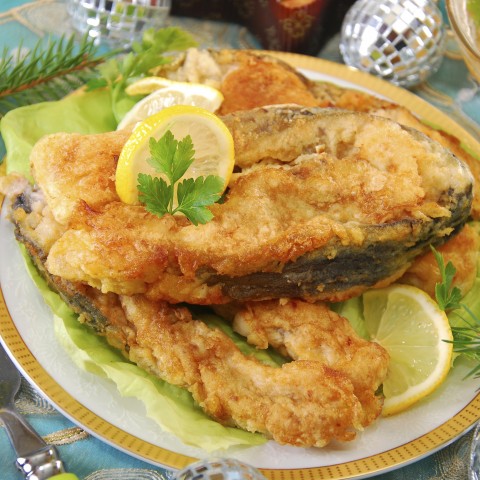
Deep-fried breaded carp is a popular Christmas Eve dinner.
- → Are you going out to eat? Check out this lesson on speaking Czech at a restaurant.
6. Traditional Holidays
There are seven public (bank) holidays in the Czech Republic:
- New Year’s Day (January 1) – This is also the Day of Recovery of the Independent Czech State, which took place in 1993.
- Liberation Day (May 8)
- Day of Slavonic Apostles Cyril and Methodius (July 5)
- Jan Hus Day (July 6)
- Day of Czech Statehood / St. Wenceslas Day (September 28)
- Independence Day (October 28) – It has nothing in common with the American Fourth of July; it’s the anniversary of the establishment of an independent Czechoslovakia in 1918.
- Day of Students’ Fight for Freedom and Democracy (November 17)
On top of that, there are three Christmas days, and Easter Monday.
Even though most Czechs are atheist, they celebrate Christian holidays including Easter and Christmas. These holidays were recognized even during the Communist era.
Our main Christmas holiday is Christmas Eve, when families decorate their Christmas trees while watching TV and eating Christmas cookies. The dinner traditionally consists of fish (preferably carp), or pork or chicken schnitzel, with potato salad.
Like I mentioned earlier, Czechs are very family-oriented and private. This means it’s not common to invite friends over during Christmas.
- → Curious to learn more on this topic? Then check out our lesson Video Culture Class: Czech Holidays!

Czech Christmas cookies are quite elaborate and are usually made two to three weeks ahead.
7. How CzechClass101.com Can Help You Learn Czech in a Fun Way
We hope you enjoyed this lesson on Czech traditions and culture. Did you learn anything new? How does Czech culture compare to that in your country? We look forward to hearing from you!
If you’re taking your Czech studies seriously, you have two solid options: grab a Czech grammar book or learn online. We think the latter is much more convenient, don’t you?
CzechClass101.com will make learning Czech easy, exciting, and fun. With us, it’s not about endless memorizing or thick textbooks. Learn Czech with us and make progress faster than you could imagine!
What can you find here?
- English-to-Czech translations and pronunciation tips/tricks
- Over 630 audio and video lessons
- Vocabulary learning tools
- Spaced repetition flashcards
- Detailed PDF lesson notes
Sign up now—it’s free!










